










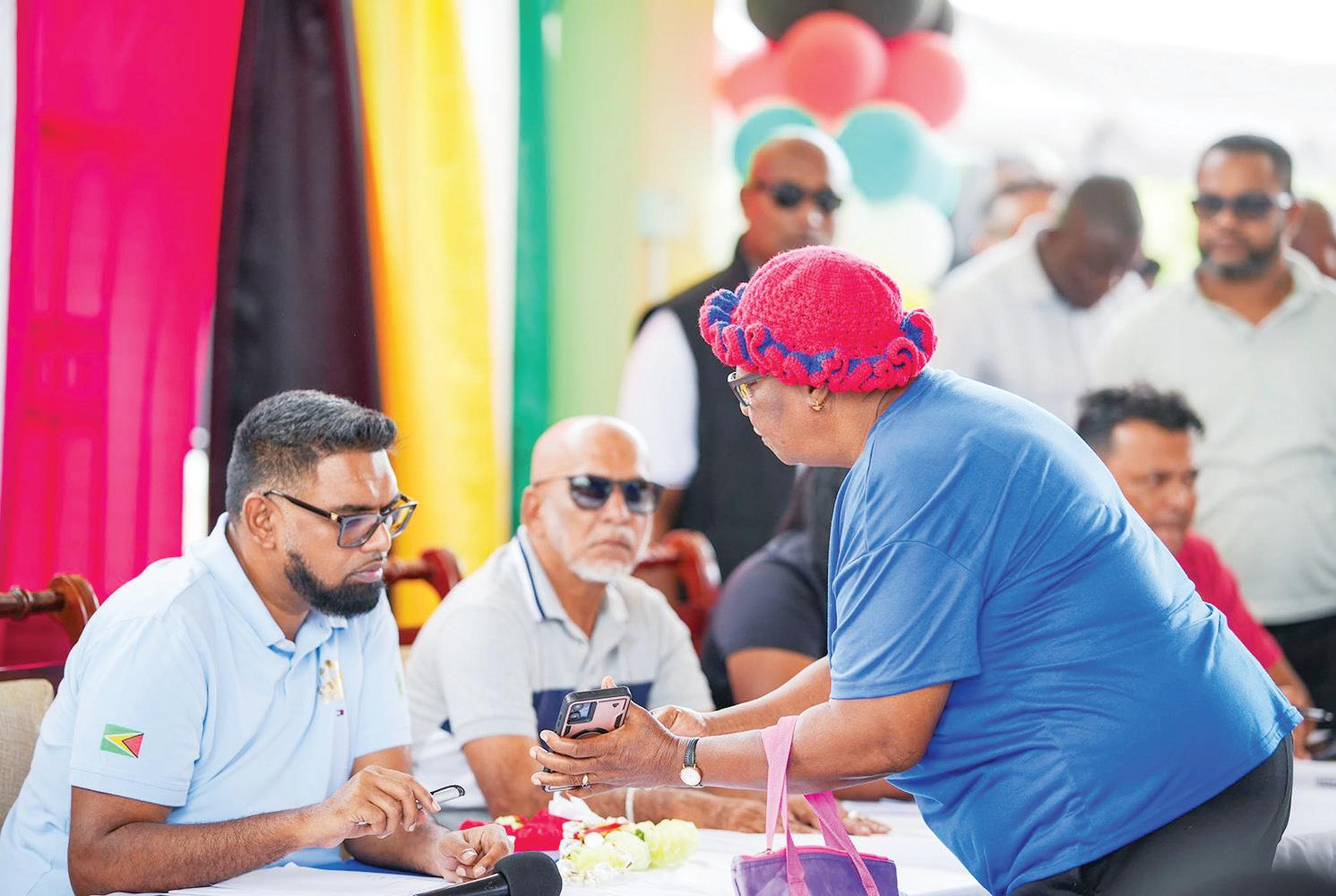

GUYANA’S agricultural sector is set to be catapulted to new heights as President, Dr Irfaan Ali on Saturday revealed that that in two weeks, a project will be launched by a private sector entity to manufacture refined sugar.
During a public meeting at La Grange Village, West Bank Demerara, the Head of State said, “While they [the opposition] don’t have an idea or a clue of how sugar will survive, in two weeks, we will have a project launched in Guyana with a private sector entity that is going to do refined sugar.”
The President noted that 175,000 tonnes of refined sugar will be produced. President Ali had previously noted that by 2027, Guyana could produce and supply enough sugar to meet the demands of the Caribbean region.
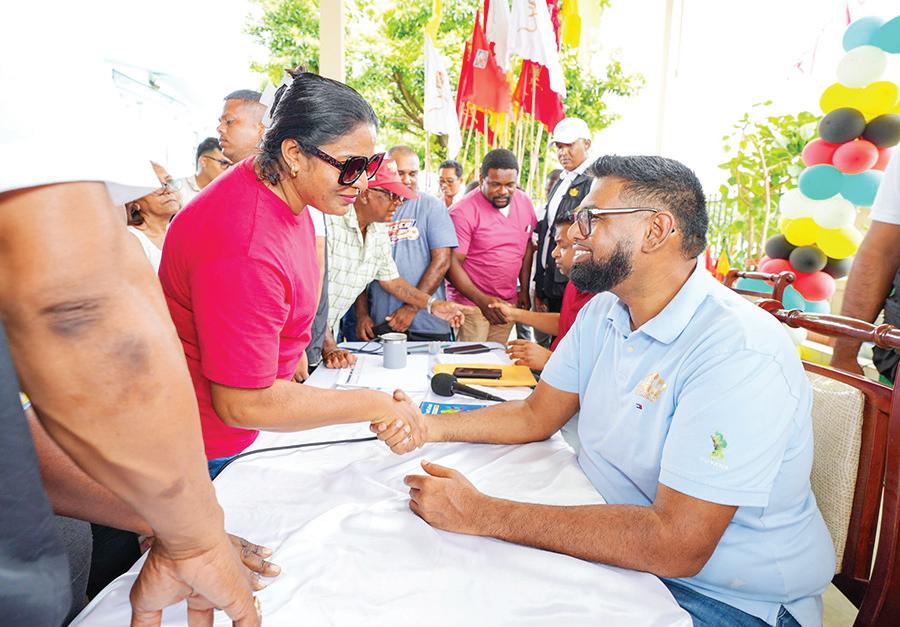
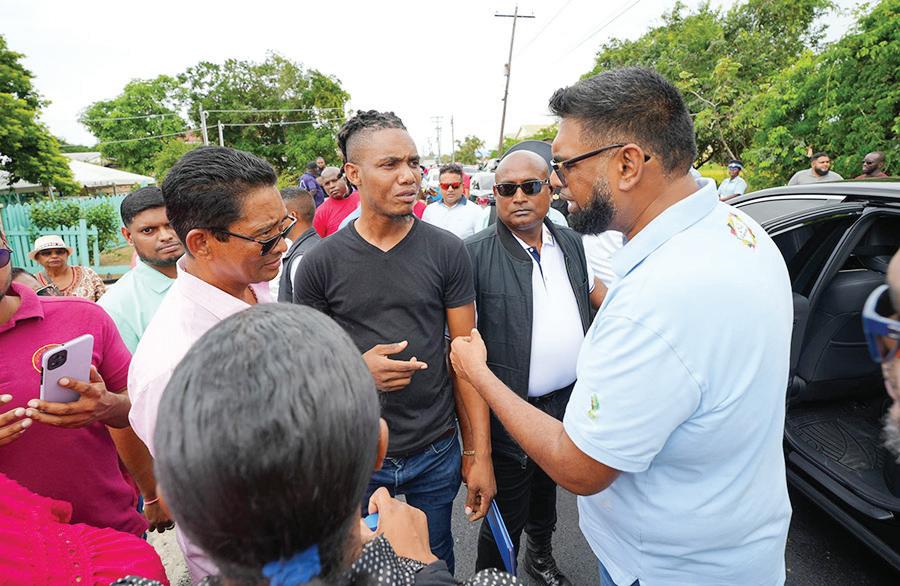
President, Dr Irfaan Ali during a public meeting at La Grange, West Bank Demerara on Saturday (Office of the President photos)
“We are ensuring that we build the viability of the sugar sector which require[s] tremendous investment, but we are very confident that Guyana will be in a position in another two years to satisfy the full sugar requirements of this region,” President Ali said.
While emphasising that the government is not overly reliant on the oil
and gas sector, he highlighted that significant attention is being given to traditional industries, including sugar, with substantial investments being made.
Last year, mechanisation works began at the Albion Sugar Estate in Berbice, Region Six, with a target to produce over 55,000 tonnes of sugar by 2026. By that year, the
Albion Estate is projected to have the capacity to produce more than 55,000 tonnes of sugar.
Additionally, the President announced that the Enmore Sugar Estate is being transformed into a sugar refinery. The proposed Enmore refinery is expected to process 180,000 metric tonnes of sugar annually, and according to President Ali, the gov-
ernment may also explore importing more sugar.
“Whatever we can supply, we’ll supply, then we’ll have to fill the gap so refining will occur here,” he said.
According to President Ali, the private sector is expected to play an active role in spurring this progress, as the refinery will present additional demand for transport and logistics
services to fuel its operations.
In 2017, the then APNU-led government had closed several major sugar estates across the country, leaving thousands of persons without jobs. Over 40,000 persons had either directly or indirectly lost sources of income when the estates were closed and investments were stymied.
At the last general and regional elections, the People’s Progressive Party (PPP) government vowed to reopen these estates and upon assuming office, major investments were made to fulfil the manifesto pledge of rehiring sugar workers and increasing sugar production.
According to recent statistics provided by the Ministry of Agriculture, over 8,000 persons are now employed across the sugar belt.

By Trina Williams
ATTEMPTS by certain agents to mislead the electorate were brought to light by President, Dr Irfaan Ali, who cautioned citizens to remain vigilant against individuals presenting themselves in communities as politically neutral, while being quietly supported by the opposition.
The President on Saturday at a public meeting at La Grange Village, West Bank Demerara, said that there was an attempt by certain figures to organise a protest at the area he was visiting. But Dr Ali fired back and made it clear that the people support the ruling People’s Progressive Party (PPP) because of its work to better the lives of all.
from the residents.
President Ali provided scenarios to demonstrate those attempts by certain agents to obfuscate in pursuit of political gain.
He said: “If the chairman is managed by the General Secretary of the PPP, Indar… then who is he affiliated with? Not the PPP? If the chairman is sent in the community by the General Secretary of the PPP, the meeting is organised by the PPP activists, this meeting is being chaired by a PPP comrade leader….”
The gathering unilaterally shouted and agreed that the chairman would be associated with the PPP.
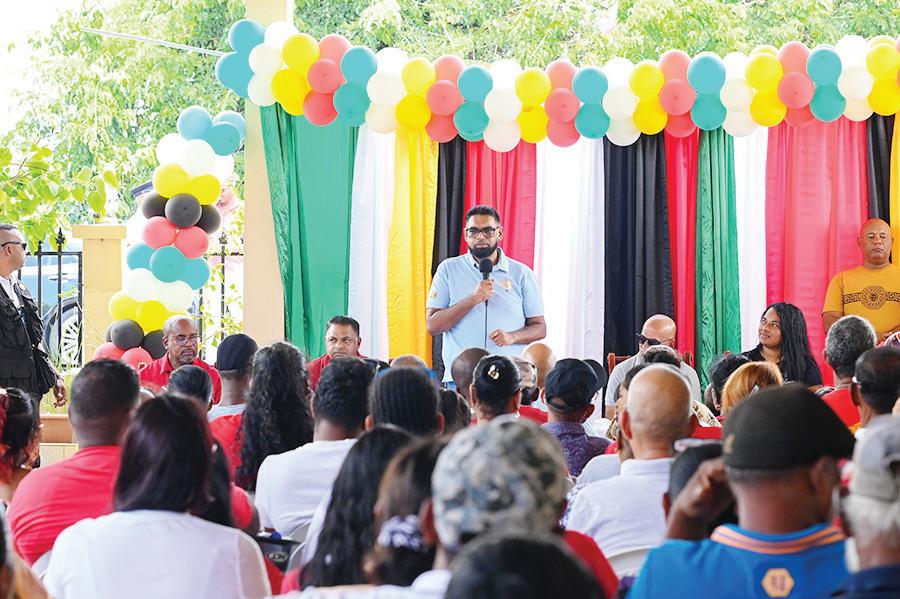
the person?”
The crowd loudly shouted: “AFC/PNC!”
- ‘The people want to know where you stand,’ President Ali tells ‘deceptive’ characters
of continuously working for the people, even when they were in the opposition.
We’ve withstood dictatorship; we’ve withstood rigged elections. We’ve withstood the confusion of different individuals and political parties seeking to manipulate the minds of people every single time they want to defeat the People’s Progressive Party.”
‘THE SYSTEM MUST WORK’
“We’re not seasonal friends of the people. We are not opportunistic friends of the people. We are servants of the people,” the President said to resounding applause
The President then presented another analysis and said: “If a businessman goes into a community, his meeting is facilitated by AFC leaders, organised by PNC activists, promoted by PNC/AFC activists; if he’s being taken around by [the] AFC/ PNC organiser. Who is
With that said, the President then posited the rhetorical question as to why persons should conceal their true identity.
“It is deception and
the PPP’s philosophy is frank and clear. “Don’t hide. If you’re coming, come. There is no shortcut and there is no side track or back track. In politics, you’re in or you’re out because the people must know where you stand.”
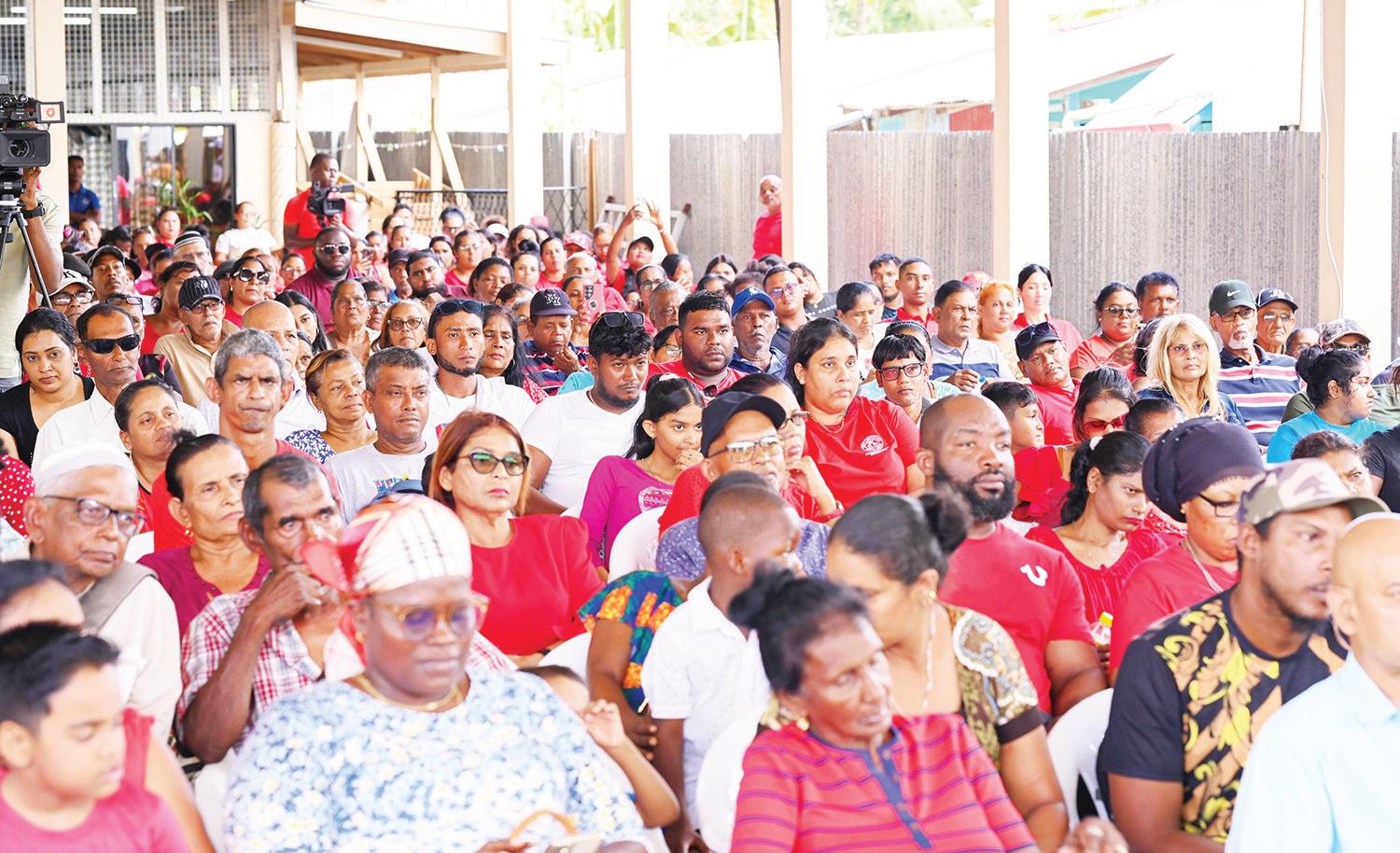
that is what we’re warning you about. The deceptive nature of what is taking place,” he said.
Dr Ali added that
The President further stated that the PPP never hid when it stood with sugar workers; it stood up front and fought and
this has been the case for all workers of this country.
‘DON’T BE FOOLED!’
Even with the opposition continuing its cycle of reinvention, constantly introducing new faces in an effort to reshape their image, President Ali reminded Guyanese that history has already proved their intended agenda.
“So do not be fooled. Every single time you saw what the configuration brought to Guyana,” he told the citizens.
The A Partnership for National Unity+Alliance For Change’s (APNU+AFC) attempt in 2020 to subvert the will of the people is an indication of their true objective, the President reminded residents.
“We have a responsibility to the people. We are not in show business. We’re in the business of development and we’re in the business of bringing prosperity to every single home,” President Ali stated.
He also made it clear that the PPP has withstood the test of time and has a track record
Dr Ali stated that the PPP firmly opposes any form of injustice and will not shield individuals who, through personal choices, have chosen to defy the law.
“The philosophy of the party is to stand up for every Guyanese in a just manner. So, every individual, every family will make choices in their life and have choices, and if your choice is to go contrary to the laws, or if your choice is to avoid your legitimate responsibility of taxes in your country, then the system must deal with you. That is not a political issue,” the President firmly stated.

By Trina Williams
PRESIDENT Dr. Irfaan Ali has labelled the opposition “unpatriotic” for politicising recent comments made by U.S. Secretary of State Marco Rubio regarding the Timehri-Craig Road on the East Bank of Demerara.
During a public meeting at La Grange, West Bank Demerara on Saturday, President Ali called out those opposition figures for twisting Rubio’s remarks to undermine national progress.
President Ali said: “These people are so unpatriotic; Secretary of State Rubio came and made some of the most important statements about Guyana; about our security, our development, our transformation, our future, our democracy. None of that registered in their heads. And I want to correct the wickedness that they’re doing on social media, Timehri-Craig is the road under construction, financed by the IDB;not the Chinese.
During his first visit to
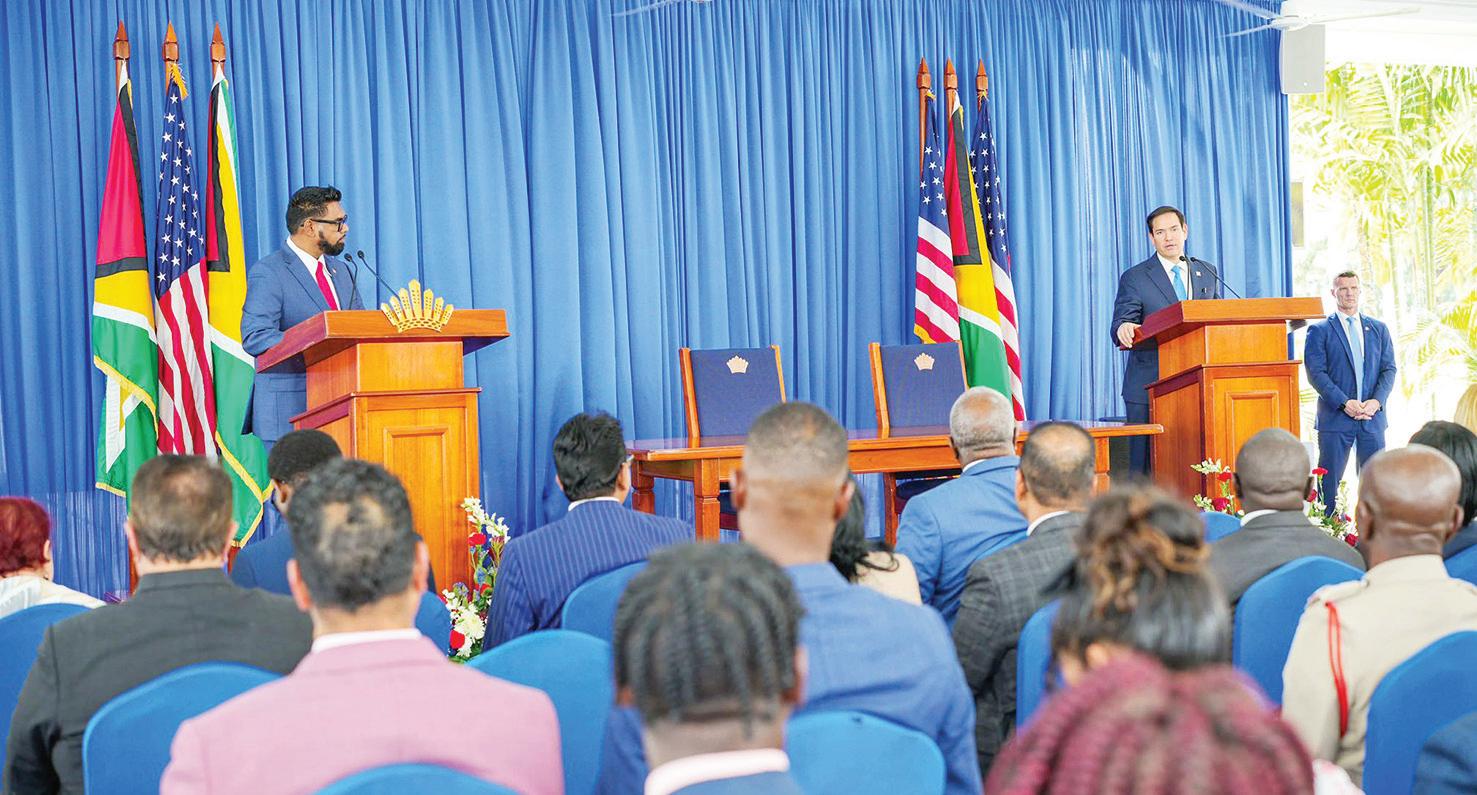
the Caribbean, including Guyana, since taking office earlier this year, Secretary of State Rubio expressed concern about the condition of a section of road in Guyana that is currently under construction, alleging that it is being funded by the Chinese. The political opposition, rather than attempting to correct the Secretary of State, seized upon Rubio's remarks and leveraged them

for their own political advantage.
But President Ali on Saturday explained that a Chinese firm won the bid advertised by the Inter-American Development Bank (IDB). The President further explained that the road is under construction.
“Instead of them [the Opposition] correcting the [U.S.] Secretary of State, they think that’s a big victory for them,” President Ali said, deeming the opposition’s actions as “nonsensical.”
Because of those detractors’ agenda, the President said that the process of how a road is constructed
is being overlooked. The Alliance For Change (AFC), through its leader Nigel Hughes, wrote the U.S. Secretary of State on the topic, and the People’s National Congress Reform (PNCR) also issued a press statement on the matter.
Notably, Guyana and China share a historical bilateral relationship that has continued to be built on since the arrival of Chinese immigrants to Guyana some decades ago. Throughout the 172 years, the Chinese presence has been visible and valuable.
The relationship between China and Guyana extends far beyond the pres-
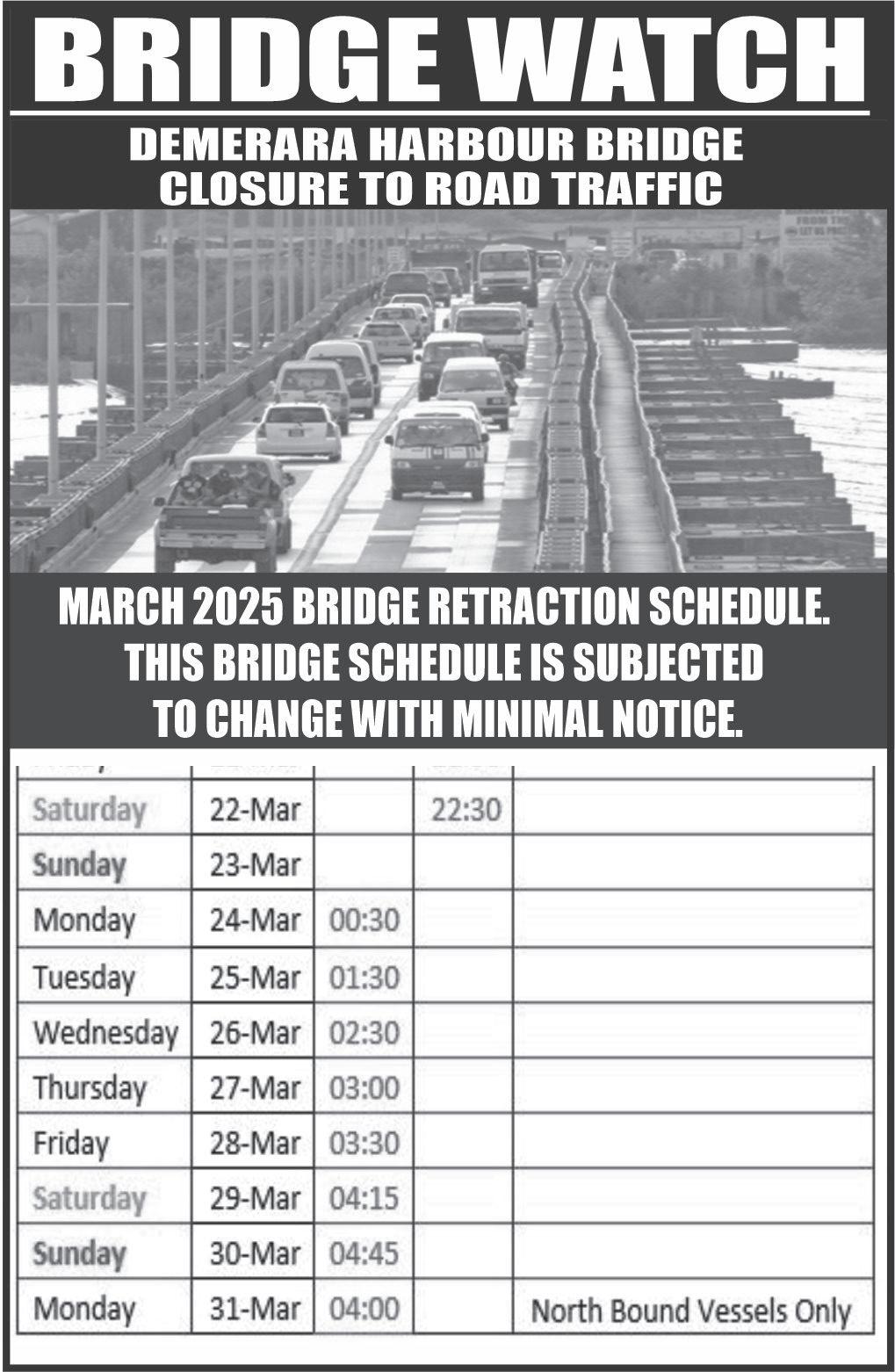
- President Ali flays Opposition for opportunistic approach regarding U.S. Secretary of State’s comments
- Clarifies that Timehri-Craig Road funded by IDB not the Chinese
ence and contribution of people, as today, there are many other facets of the relationship, including the local celebration of Chinese culture and festivals, and all other aspects of Chinese identity by all Guyanese, irrespective of ethnic and cultural backgrounds.
In almost every sector of our economy, there are Chinese companies contributing to what the government is trying to achieve, and participating in all that Guyana has accomplished.
In recent years, Guyana has experienced an extraordinarily rapid economic growth, which is anticipated to continue to grow by 30 per cent per annum.
Additionally, Guyana continues to see the United States of America as a trusted partner with shared values, mutual trust and friendship.
This was affirmed by Dr. Ali following the signing of a Memorandum of Understanding (MoU) aimed at enhancing security cooperation between Guyana and the U.S. on Thursday last.
Secretary of State Rubio and Guyana’s Foreign Affairs Minister Hugh Todd signed the agreement, which outlines a framework to address security challenges such as narcotics trafficking, transnational organised crime, and broader security.
“The best of partnerships are those built on shared values, mutual trust, and a commitment to the Rule of Law and International Order. This is what underpins our bilateral relationship,” President Ali said, adding: “Our partnership and joint commitment to the safeguard of this region from every disruptive force is key to the maintenance of democracy, and an adherence to the Rule of Law.”
The agreement also allows for greater cooperation in trade, energy, human capital development, and infrastructure. This, the Guyanese leader said, further ‘consolidates’ the two countries’ bilateral partnership, further defining policies and outlining clear intentions.
Rubio also noted that Guyana is on the brink of a transformative era that could drive regional prosperity and reshape the country’s future.
He said that under the Ali-led administration, Guyanese and the wider Caribbean could see vast transformation.
“Your lives are going to look very different in five to 10 years under this leadership and this vision,” Rubio told a Thursday press briefing at State House.

By Shaniya Harding
GUYANA has taken yet another step in the direction of digital development with new digital licence renewal portals that will soon be launched nationwide. This groundbreaking initiative was announced by President Dr. Irfaan Ali on Saturday at Leonora, West Coast Demerara.
Speaking to a crowd of some 2,000 Guyanese at the Leonora Track and Field Centre, President Ali reaffirmed his administration’s commitment to transforming Guyana into a digitally advanced nation. He unveiled a series of initiatives aimed at modernising services by integrating technology into
everyday life.
The highlight of these announcements, however, is the launch of digital licence renewal portals, a move that places Guyana among the pioneering nations embracing new technology-driven public services.
“We are right now investing in digital Guyana. In every aspect of national life, we are putting the infrastructure in place to unleash in the next five years a digital platform that will support every aspect of life in Guyana,” President Ali said.
An important aspect of this digital transformation is accessibility, with the renewal portals being facilitated through automated kiosks for licence renewal. This step, the President said, was taken to enhance efficiency and mi-
nimise bureaucratic hurdles.
“We are now working to be among the first 10% of countries to have digital licence renewal portals. This is like kiosks, like an ATM machine,” the Head of State explained.
The portals will be installed at various locations across the country, including malls and police stations, offering citizens a seamless and user-friendly process for renewing their licences.
“You just scan your licence, use your debit or credit card, and you renew your licence right there at any facility,” President Ali shared. This move aligns with the administration’s broader objective of reducing human biases within government systems.
“So, part of this is also
to remove the human biases and human interference and lapses in the system,” he noted.
In addition to the licence renewal kiosks, the government is also working towards integrating a digital payment system in collaboration with India. As the Head of State explained, “Soon, you will see, we are launching a digital wallet, and we are working with India on migrating our payment platform to a digital platform, where payments will be made from your phones, and that will be now your payment wallet,” he shared.
The President emphasised that these initiatives are part of the government’s long-term vision to create a sustainable and resilient

digital infrastructure.
“We look at long-term challenges and long-term issues, and we try to develop policies and programmes that would not only look at immediate gratification but look at long-term benefits and longterm results so that they are sustainable and resilient in nature.”
The People’s Progressive Party Civic (PPP/C) administration has always championed modernisation efforts, with a forward-thinking approach to policy making and projects, the President said, noting that, “One of the good things about the
People’s Progressive Party/ Civic Government is that we always embrace policies and programmes that are very futuristic. We are not short-sighted in our vision. We are not narrow in our vision.”
As the government continues to push its digital agenda, the launch of these initiatives promises greater efficiency, transparency, and accessibility to public services. With investments in infrastructure and technology, Guyana will continue to position itself as a leader in digital innovation within the region.
THE Private Sector Commission (PSC) has welcomed the United States' commitment to supporting Guyana's economic and territorial security, as reaffirmed by U.S. Secretary of State Marco Rubio during his visit to Guyana last week as part of his Caribbean tour.
“The PSC…welcomes the unequivocal commitment expressed by the Secretary of State in support of the maintenance and security of the economic stability of Guyana,” the commission stated in a release on Saturday.
The PSC stated that the high-ranking U.S. official reaffirmed the United States' firm stance against any ag -
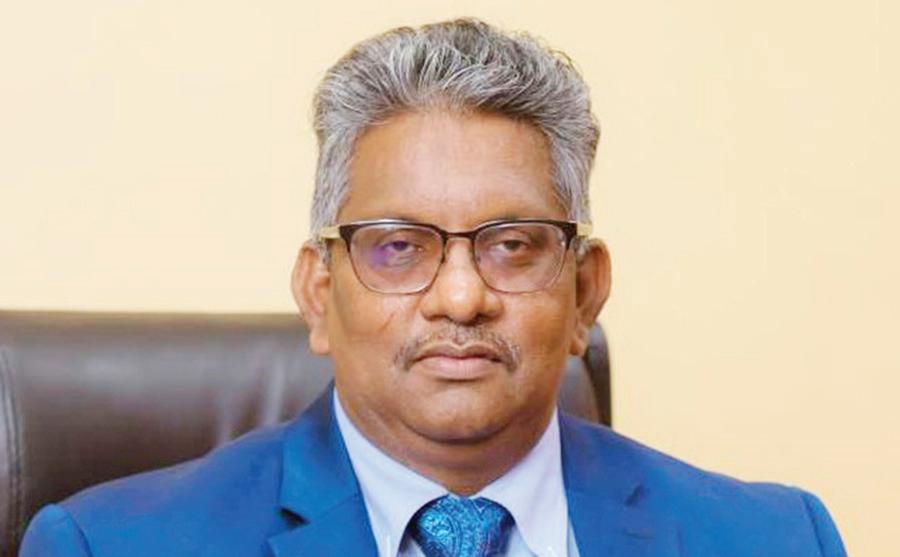
gressive threats to Guyana’s territorial integrity, strengthening investor confidence and bolstering trust within the business community.
“The [PSC] at this time, when the Nicolás Maduro regime has openly threatened the annexation of the Essequibo region of Guyana, more than welcomes the unmistakable warning of

Secretary Rubio to the Maduro regime of the serious consequences of any hostile actions against Guyana or ExxonMobil’s operations within Guyana’s territorial waters.”
The organisation em-
phasised the strategic importance of these assurances, noting that they provide crucial security guarantees for businesses in Guyana while further boosting investor confidence.
In addition, the PSC said it welcomed Rubio’s undertaking to raise the Caribbean’s concerns with regard to the United States’ proposed trade measures on Chinese-built vessels.
“The PSC appreciates his pledge to engage with U.S. trade-policy officials to ensure that the potential economic impact on Caribbean nations, including Guyana,
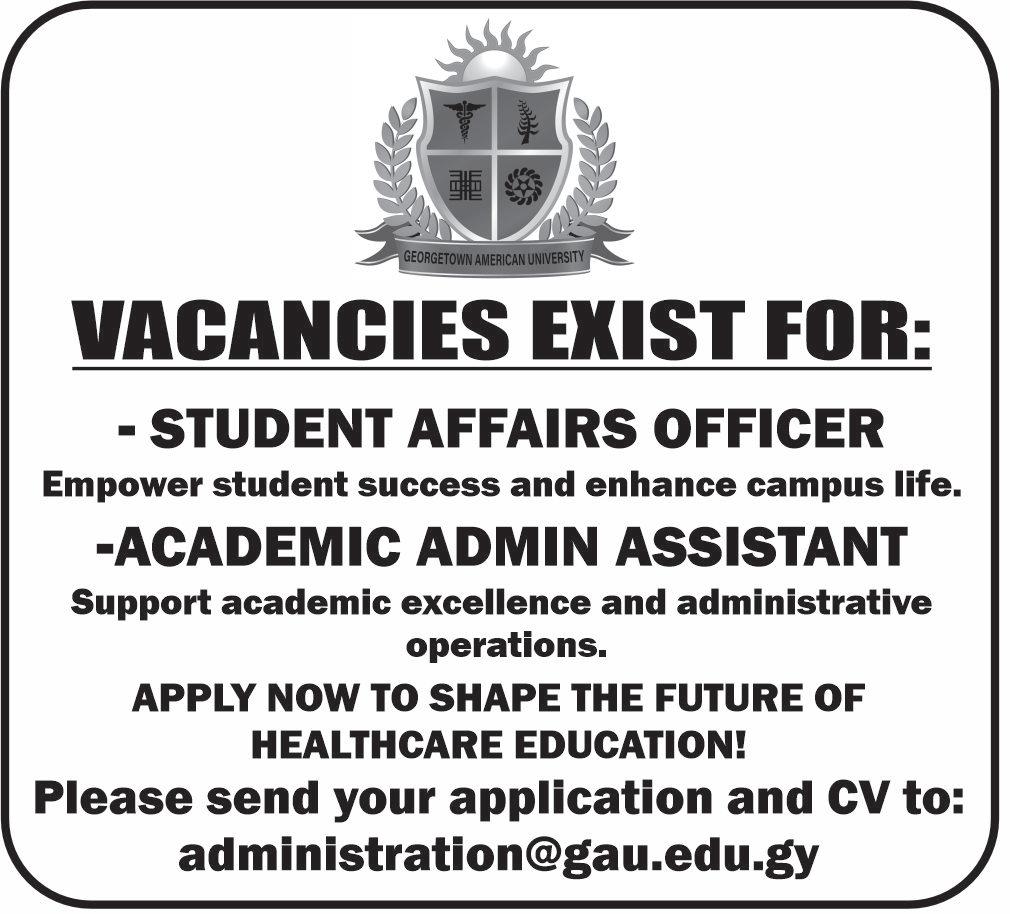
is taken into consideration. We believe that this continuing dialogue is crucial in protecting the economic interests of small developing states that rely on international trade,” the release added.
In closing, the commission underscored that it remained committed to fostering a business environment that is secure, competitive, and attractive to both local and foreign investors.
“We stand in sup -
port of the Government of Guyana’s continued efforts to engage international allies in matters of economic and national security.”



AS Guyana prepares to conduct its General and Regional Elections, the Ethnic Relations Commission (ERC) has issued an urgent call for peace and restraint, drawing attention to the dangers that attend ethnic and political tensions usual in election seasons in the nation.
The call is not merely timely but also indispensable, as Guyana's multi-ethnic society has long grappled with the fact of polarisation during politically charged moments. The ERC's announcement is both an alarm and a chance—a hope for Guyanese to go beyond rhetoric that segregates and to
embrace the ideals of harmony, respect and unity.
The ERC's denunciation of hate speech and disinformation online and offline is an indication of the pervasive presence of hate speech and disinformation. In this age of cybercommunication, where one posting can trigger passion across communities, the commission's appeal to citizens to talk back constructively is a reminder that words have power—both as tools of division and instruments of healing. Political leaders and their supporters must take heed of this accusation, knowing that they are setting the tone for national discourse.
Failing to do so risks further polarising ethnic cleavages long entrenched in Guyana's politics.
High stakes are involved. Guyana’s elections have consistently been marred by allegations of fraud, ethnic discrimination and even violence. The recollections of electoral turbulence were still raw in the national psyche, but they also present an opportunity for change. The ERC's efforts, including its "Countering Hate Speech" campaign and collaborations with global organisations such as the United Nations Development Programme (UNDP), exemplify active measures towards building
resilience against polarising narratives.
These efforts need to be backed by all stakeholders, ranging from political parties to civil society, to bear fruit. The publication of such reports serves a very important purpose. But unity is not to be gained on platitudes alone; it must be built on confronting systemic concerns that drive division.
Economic disparities and perceived ethnic bias in the distribution of resources persist and agitate. As the oil economy of Guyana expands, it is crucial that its prosperity is spread evenly across all ethnic groups to avoid further polarisation.
Political parties, particularly the PNCR and the AFC, need to move beyond ethnic mobilisation and appeal to policies that enable inclusivity and collective growth. This election cycle offers a chance for Guyanese to restart their political culture— not as one of competition, but of co-operation. The ERC's call to "walk together" needs to be sung from the heart of every community to remind citizens of the higher, unbreakable heritage that separates them much more than any disagreement. As wisely put by Vice President Bharrat Jagdeo, Guyana has once demonstrated remarkable maturity in moving be-
yond hard issues of the past. This resilience will now have to be directed inward toward bui lding bridges and not walls.
Lastly, peace is not only the duty of leaders but also that of all citizens. Rejecting hate speech, embracing diversity, and prioritising national interest over partisan advantage are not ideals but imperatives for safeguarding Guyana's future. During the campaign season, let this be a moment when Guyanese show themselves and the world that unity is not only possible but inevitable, when guided by respect and understanding for each other.

As a youth, I no longer want to associate with the PNC/R
Dear Editor,
AS a young resident of Linden interested in community development and politics, I took the opportunity several days ago to attend a meeting organised by a PNC/R member. Several local leaders were present, including the PNC/R leader and the leader of the opposition, Mr. Norton. What struck me was the mayor's visibly angry disposition as he angrily vented his disapproval of public comments made by a member he described as a
leading party official. The official, he said, had made comments contrary to the mayor's position on free tolls for the Wismar-Mackenzie Bridge. When party leader Mr. Norton asked who the official was, the mayor said MP Figueira. To my surprise, the leader responded, "He is still an official?" and "No one has written anything about it." Everyone remained silent until an old man responded that he would write a response. Editor, what was interesting about that meeting (my first, I must add) was

the apparent dislike some PNC/R local leaders have for MP Figueira, one of their own members and, frankly, the only PNC/R leader who does so much good for the people of Linden and Region Ten. He is very popular and well-loved by so many people, including me and my friends, many of whom benefit from his many distributions.
But what was striking was for the leader of the party, of which MP Figueira is a part, to question his position openly in such a public manner and basically
encourage his party comrades to challenge him. The party leader and some local leaders clearly have an issue with MP Figueira, but why? While the meeting continued, I took the time to Google what MP Figueira really said that got these people so worked up. Upon reading his opinion piece, I really didn't see what the issue was. MP Figueira supported the toll fee, which everyone else did, including the party leader, and I saw that he provided some very good ideas, in my view, for the council to gain more
revenue.
Mr. Editor, my experience at that PNC/R meeting was indeed a telling one, and as a young person, I see that the PNC/R party and its leadership have much healing and work to do. To bash and berate one of their own like that, without reason, one of their MPs who is the only one I have seen doing real work to help his community and offering solutions that could benefit it only to have his own party leader publicly try to discredit him to party members and visitors is unacceptable. This is
clearly not a party I, as a young person, would want to be a part of. I got interested in community work and politics because of what I say MP Figueira has been doing for years, but this is not the type of group I would want to be associated with any longer. This party needs real leadership and to have an appreciation for its members and supporters and show gratitude for the people who are genuinely trying to do good.
Yours sincerely, Concerned youth.

Guyana
is once again inviting Guyanese to take part in public meetings on its upcoming offshore projects. The focus this month has been on the Longtail Development Project. Soon, the company will start another round of meetings on its Hammerhead Development Project. These meetings have become a hallmark of ExxonMobil’s approach to engaging with communities on new projects. They allow
citizens to voice any concerns or questions about upcoming projects. This initiative builds relationships and aligns with the Environmental Protection Agency’s (EPA) guidelines, ensuring that environmental and social issues are front and centre as plans progress.
The meetings follow ExxonMobil’s recent application to the EPA for the Longtail Development Project. Following a structured plan, this project will unfold in stages – from drilling and
equipment installation to production operations and eventually decommissioning.
What’s great about these meetings is that they enable everyday Guyanese—community members, local business representatives, and environmental advocates— to gain direct insights into what ExxonMobil is planning. This emphasis on transparency means that people can hear firsthand from the company, reducing the risk of misinformation
that can often distort the conversation.
These gatherings give Guyanese a unique opportunity to raise their questions and share their concerns. It’s a chance to engage directly with those managing the project, helping everyone to better understand both the potential benefits and the challenges that may arise.
The Longtail project aims to produce between 200,000 and 290,000 barrels of oil daily, with production expected to start in 2030. Its
contributions will be key to Guyana’s ambitious goal of reaching over one million barrels daily by the same year. More oil production translates to more revenues for the country, setting the stage for economic growth, job creation, and increased investment opportunities.
The Hammerhead development is expected to target between 120,000 and 180,000 barrels of oil daily with a projected start up in 2029, once it gets the necessary approvals.
Looking around Guyana, it’s clear that the landscape has undergone significant transformation since the start of oil production. Infrastructure improvements are apparent, and there’s been a noticeable uplift across various sectors, including health, education, and agriculture. With each new project on the horizon, the prospects for continued growth and development only seem to expand.
Dear Editor, FROM time immemorial and throughout the human existence, one characteristic of the human being has remained constant, and that is many of us are never satisfied and contentment is a constant challenge. Our wants are always insatiable no matter how much we are given, and religions and philosophical thinkers have written volumes trying to quell this thirst for more and more and in some instances they were able to be successful but in the majority of cases they failed to cure the human greed. The Holy Bible, the Holy Quran and the Bhagavad Gita exhort us to have patience and to be contented. In the world today we need a spiritual revival.
Today, in Guyana this greed has become intensified as cash and gifts are floating around in different parts of rural areas to the point where the contentment of the people are put to a test and greed is exposed. It has escalated to a point where some people think that the government should be handing out not only a hundred thousand dollars but a million dollar to each individual, in addition to a house and
land and a motor car. This is the starting proposal which I feel will escalate to another level even if materialised. This is probably a mission for Santa Claus and not a sitting government. Even Santa Claus does not create such high expectations, but the masses believe that the billionaire philanthropist Mr. Azruddin Mohammed could achieve this by waving a magic wand. It is easy and costs nothing to listen to the concerns of citizens and placate them and allow them to believe that such a utopian society is achievable. It is commendable that this person undoubtedly, has done more than many rich persons in this country: donating houses, cars, and other material items but the misconception that this can be done for each and every Guyanese is certainly impossible. I am sure that every person who surrounded him is afflicted by this illusive dream. In Islam the holy prophet, peace be upon him, made it pellucid when he emphasised the importance of giving charity, especially in secret, and cautioned against giving charity to be seen by men, as this would make it a form of self-promotion rather than genuine compassion. The intention when giving
charity (Zakaat) is also an important factor which must be seriously considered. This show of charity is condemned not only in Islam but by all religions.
In all fairness to Mr Mohamed, he has not openly declared his intention to form a political party and contest the upcoming general elections but the people attending his outreaches seemed to encourage him to do so and some even addressed him as their ‘president’. What is a critical point to note is that he did not discourage them to address him as such and this would seem to suggest that at some point in time he will enter the political arena. However, at one of his ‘outreach’ in Glasgow he indicated that he can defeat all the political parties. This implies contesting the upcoming Elections. Therefore, it would seem that at this point he is doing a feasibility study to test the waters before his final decision. However, attracting a crowd of people whose intention is just for their own short term selfish agenda and not that of the country as a whole is bound to fail when the goodies stop flowing as the finances dry up. It is basic economics that resources are limited in
comparison to our wants and this means that choices have to be made. A country is not run like a charity home. Mr Ravi Dev of ROAR learned this the hard way when he decided to launch into politics after having crowds across the country at his many outreaches and he is by far more intellectually capable than many persons I have seen and heard.
What is appalling and disappointing is that some of our people suffer from selective amnesia. Just over four years ago our economy was on the verge of bankruptcy with massive squandering by the Coalition government from 2015 to 2020. Over seven thousand sugar workers were pauperized overnight and the wage freeze in the sugar industry was reminiscent of the Burnham era.
People were literally starving and children were not able to attend school on a regular basis, and some had to drop out to earn money for food. The Because We Care cash grant was callously snatched away as were the old age pensioner water and electricity subsidies. Roads, bridges and other infrastructure were falling apart.
Today, these same people who are complaining
are walking on roads and not dirt dams, and the general aesthetic quality of the environment has improved beyond expectations. Their pockets have more disposable income with every annual budget. Over 15,000 part-time jobs were created in Region 6 alone, with a person earning $40 thousand per month by just working 10 days per month for approximately four hours daily. This is $600 million per month or $7.2 billion per annum. This has greatly improved the lives of their family since most of these persons have other sources of income (some have husbands working). What is the amount of money Mr Mohammed has donated so far? This is the money earned by part-time workers alone and is just a speck of what this government has done to improve the lives of people in Region Six.
One must not forget the $100,000 for every mother giving birth and the $100,000 cash grant. Why are some people so myopic? The whole country is benefitting from these magnanimous initiatives, the brainchild of the Vice President. The list of benefits to the people from the 2025 Budget is unending.
I have never witnessed
such gullibility in my life. How can anyone’s conscience allow them to give false expectations when he is fully aware that this is just a publicity stunt? How can people not think about what their living conditions were just a few years ago and what it has elevated to now? Some serious introspection is needed. Not so long ago, the Guyanese people were crying for change, and now, again, they are crying for change. One needs to understand that this government has resolved so many issues affecting the people and has put this country once again in an upward trajectory. Patience is a virtue, just like contentment, and we need to assess where we are today as a nation compared to where we were just four years ago.
In conclusion, this is a democratic country, and everyone is free to express his or her opinion but deceiving the populace is morally wrong and as the Vice President pointed out at his weekly press conference violence in any form cannot be condoned and protests should be peaceful and within the confines of our laws.
Yours sincerely, Haseef Yusuf
ONE of my closest friends, Colin Smith, before he died a few years ago, was a staunch Catholic. He succeeded Father Andrew Morrison as the editor of the Catholic Standard. Many, many moons ago, Colin said something to me that opened my eyes. That something has remained embedded in my mind, and thus I can remember the ambience in which it was said.
It was a Sunday, and we were returning from Berbice. We were leaning against the wall of the ferry looking down at the Berbice River. I can’t remember what the topic was but I know he said to me that in the 1950s, Guyana’s GNP and GDP were higher than Malaysia and Singapore. I was a university lecturer at the time, and should I have known that fact, I didn’t. I couldn’t believe what he was telling me because, at the time, both countries were economic giants among developing countries.
I checked it and it was right. After 60 years of Inde-
pendence of the CARICOM family, CARICOM nations are way behind Malaysia and Singapore. In fact, without making any comparison, economic development in CARICOM countries after 60 years of Independence should have been phenomenal.
In 2025, the world is changing rapidly and the CARICOM family is facing an uncertain future. Sir Ronald Sanders, a hugely experienced Guyanese in global economic affairs, recently penned an article in which he attributes the precarious economies of CARICOM as partly self-inflicted.
I quote him: “For decades, many Caribbean nations have grappled with dependence on a small number of powerful countries. These dependencies, while convenient in the short term, have far-reaching implications that undermine the sovereignty, economic resilience, and social cohesion of the region. Yet this vulnerability is not imposed solely by big countries outside the region; it is fuelled by our own choices
and the persistence of historically ingrained attitudes of dependence.”
For me, as a Guyanese academic, the most important section of Sir Ronald’s output is the part of our own leaders’ contribution to the Caribbean’s endangered future by their congenital colonial minds. After communism fell in Eastern Europe, the European Union rushed to make the former communist countries members of the EU.
Today, there are 27 members, and with the exception of English-speaking Malta and Ireland, each speak their own language and have their own histories and cultures. In the EU, there are no border and visa restrictions. Compare this with the former British colonies in the West Indies. Some of these islands are micro-states of a few hundred thousand citizens with Jamaica, Trinidad, and Guyana together accounting for four and a half million people.
Yet, the CARICOM family has no firmly integrated economic system. Jamaica
IF you followed the live coverage of U.S. Secretary of State Marco Rubio’s visit to Guyana last Thursday, you might have heard of a gang called Tren de Aragua or TdA. Rubio referred to them “as some really bad people” and as “one of the most dangerous gangs the world has ever seen.”
In answer to a reporter’s question, Rubio said that Marines at the U.S. detention facility at Guantanamo described TdA inmates as “some of the roughest people” they’ve ever interacted with, and “worse than the al-Qaida guys that were in their jails.”
In January, President Donald Trump signed an executive order declaring TdA, Mara Salvatrucha or MS-13, the Sinaloa Cartel and half a dozen other entities as “foreign terrorist organisations.” ICE began taking aggressive steps to round up their members using body tattoos as “identifiers.” TdA members are believed to be embedded in at least 16 U.S. states. So far, 394 members of TdA have been arrested in the U.S. Readers might have seen the blurred videos and photos
of TdA members in white outfits, shackled, huddled over, their hair and beards being shaved off. What has TdA done to warrant such a harsh categorisation, and why should Guyanese care?
TdA emerged in 2014 from within the walls of the notorious Tocoron prison in the Venezuelan state of Aragua. The prison was teeming with young and poor men crammed together in inhumane conditions, a process of mass incarceration that began under President Hugo Chevez and expanded under President Nicholas Maduro.
TdA was founded by Hector “El Niño” Guerrero, and his loyal followers began extorting money from prisoners for food, use of special facilities and protection from other inmates. The gang even opened and ran businesses inside the prison which included a club. Those on the outside expanded operations to include kidnapping, assault and murder.
Between 2014 and 2018, Venezuela had one of the highest displacement rates in the world. Almost three million people fled the country. TdA members used the
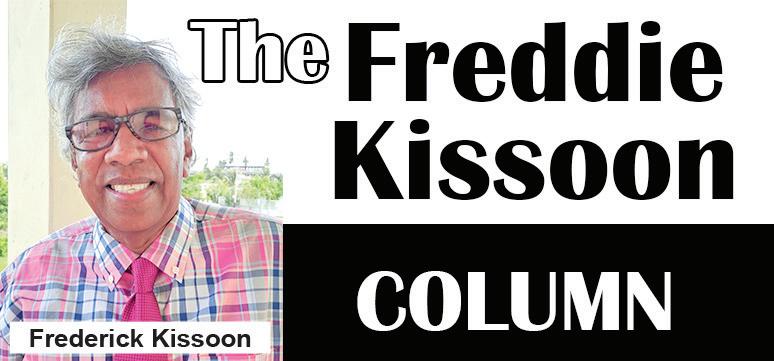
sees itself geographically closer to the U.S., and so does the Bahamas. Trinidad refuses to obey CARICOM trade rules. There is still no free movement within the CARICOM family, and visa-exception only last for 90 days. CARICOM nationals are jailed by individual CARICOM countries for either illegal entry or overstaying their time.
It was Naipaul who was reviled across the region for disdaining the CARICOM family as a region that is incapable of inventing anything. His book “The Mimic Men” was a subtle accusation that all Caribbean people can do is mimic their former colonial rulers. What is incredible is that for the past 25 years, CARICOM heads have been meeting yearly. Each year comes and goes, and the CARICOM family
remains as it was before the heads had their yearly meeting.
This unchanging CARICOM is now at a crossroads. The world is changing rapidly and the CARICOM family now faces choices that they escaped from the past 60 years because CARICOM countries were happy with their dependence on their traditional friends. The foreign policy of the American Government has to be an urgent discussion for every CARICOM nation.
Two issues directly impact CARICOM economies. One is the U.S. policy of sanctions if CARICOM states continue to have Cuban medical brigades work in the region. The other is the U.S. plan to levy huge charges on Chinese vessels coming to U.S. ports. This would severely damage CARICOM
economies because of astronomical increases in prices.
Secretary of State, Mark Rubio, has agreed to have discussions with his Cabinet colleagues on CARICOM’s concern. But the question is if the U.S. government offers to soften the impact of the fee levies and allow the Cuban doctors to continue to work, will that be an eye opener and will the world see a less dependent CARICOM? In the coming crisis, oil-rich Guyana should offer a helping hand to small CARICOM nations. This will be part of the lasting legacy of Dr. Irfaan Ali.
DISCLAIMER: The views and opinions expressed in this column are solely those of the author and do not necessarily reflect the official policy or position of the Guyana National Newspapers Limited.
exodus as cover to get into the United States.
Once there, they expanded their criminal portfolio to include human trafficking, muggings, home-invasion, retail theft, jewellery heists, robbing department stores and sexual exploitation of women from Chile, Colombia and Peru. Authorities in the United States and South America were able to connect TdA to a number of politically- motivated murders.
Two days ago, Chilean officials met with representatives from the International Criminal Court (ICC) to provide them with information about the murder of a Venezuelan dissident, Ronald Ojeda. Ojeda, a former Venezuelan lieutenant, was kidnapped from his apartment in Santiago in February 2024 by men posing as police officers. Chilean authorities allege that a TdA cell carried out the murder at the behest of President Nicolas Maduro. If Chile has concrete evidence linking Maduro to the murder of Ojeda, it amounts to a clear violation of Chilean sovereignty, and that comes with serious implications for Venezuela.

Two days before Rubio touched down in Georgetown, the White House accused Venezuela of infiltrating the United States using transnational criminal entities. The WH slapped a 25% tariff on all goods from any country that imports Venezuelan oil.
The WH “Fact Sheet” states: “These tariffs aim to sever the financial lifelines of Nicolas Maduro’s corrupt regime and curb its destabilising influence across the Western Hemisphere.” The Fact Sheet goes on to say that the tariff targets transnational criminal threats, such as the Tren de Aragua (TdA) gang.
In his press event with President Mohamed Irfaan Ali, Rubio mentioned a TdA gang member who was deported back to Venezuela. Rubio said the TdA member had attacked a New York police officer and laughed about it in court “with a smirk on
his face.” When he got off the plane, Rubio said, the TdA member was embraced and welcomed home by Diosdado Cabello Rondon. “I don’t know if you’ve heard of this guy?” Rubio asked those of us attending the event. I never heard of the man and so I looked him up.
Cabello Rondón is currently Maduro’s Minister of Interior, Justice, and Peace. He is tasked with oversight of Venezuela’s police forces and prisons and was the former president of Venezuela’s Constituent National Assembly, President and Vice-President of Venezuela, and is an active member of the Venezuelan armed forces with the rank of Captain.
The U.S. government says Cabello Rondón coordinated a network involving the Revolutionary Armed Forces of Colombia (FARC) and high-ranking Venezuelan officials to transport
and distribute large amounts of cocaine shipments and help provide FARC with military-grade weapons, including machine guns, ammunition, rocket launchers and explosives.
Cabello Rondón was indicted in the Southern District of New York and charged with “narco-terrorism conspiracy, cocaine trafficking, conspiracy to use and carry machine guns and destructive devices in furtherance of a drug crime.” In January 2025, the U.S. State Department offered a reward of up to $ 25 million for information leading to his arrest and/or conviction.
DISCLAIMER: The views and opinions expressed in this column are solely those of the author and do not necessarily reflect the official policy or position of the Guyana National Newspapers Limited.
AS technological advances continue, the way essential government services are accessed continues to change rapidly, with the Government of Guyana investing heavily to move more services online as part of its digital transformation agenda.
Moving away from paper-based systems to digital platforms has the potential to improve efficiency, increase transparency, and enhance collaboration across the public sector. However, embracing technology is not just about adopting the latest innovations; it requires careful planning to ensure that systems are reliable, secure, and adaptable to the needs of government agencies and those they serve.
Electronic services or eServices are digital tools that help government agencies work more efficiently by replacing paper-based processes with faster, online systems. These services benefit ordinary citizens by making government operations smoother and reducing wait times. Over the years, the NDMA has developed several key eServices, including electronic systems for social assistance, digital platforms for processing housing and land applications and electronic document management systems for government agencies.
The National Data Management Authority (NDMA) is at the forefront of government’s ICT solutions, with responsibility for designing, developing, and deploying eServices that help government agencies function more efficiently.
Our work is to design eServices for the internal operations of government ministries, departments and agencies, ensuring that these systems integrate seamlessly into their workflows, allowing public servants to do their jobs more effectively, while maintaining high levels of security and reliability in the services they deliver to the public.
The transition to electronic processes requires more than just technology. It demands structured training, well-planned implementation and safeguards that prevent disruptions. For the NDMA, innovation and reliability must go hand in hand, ensuring that the public can rely on these systems to function smoothly and securely. No two ministries or departments operate the same way.
This is why the NDMA takes a tailored approach to eServices development. Each solution is designed based on the specific requirements of the requesting agency, ensuring that it aligns with their internal processes and objectives. For example, some agencies require document-management systems to digitise approvals and reduce paperwork, while others may need integrated databases that allow for seamless information sharing between departments. The NDMA works closely with each agency to assess their needs and design solutions that are not only efficient, but also user-friendly for those who will be using them daily.
One of the key advantages of the NDMA’s eServices is that they are built with interoperability
in mind, meaning different government systems can easily connect and share data with each other. Many government departments rely on data from multiple sources, and siloed systems can slow down decision-making.
By ensuring that different eServices can communicate with one another, the NDMA enables agencies to work more efficiently, while improving the overall coordination of government operations. Whenever a new eService is introduced, the NDMA provides structured training sessions for agency staff. These sessions focus on ensuring that users understand how to navigate the system, input and retrieve data correctly and troubleshoot basic issues. In addition to in-person or virtual training, the NDMA develops comprehensive user manuals and video tutorials to provide ongoing support.
Beyond initial training, NDMA maintains a dedicated technical support system to assist agencies with any challenges they may face while using eServices. This ensures that government employees have access to timely assistance whenever they

encounter difficulties, minimising disruptions and allowing agencies to maximise the benefits of digital transformation.
When government workers can quickly resolve issues, it means fewer delays in the processing of applications and faster approval time when the public accesses essential government services. Reliability is a core principle in the NDMA’s approach to digital transformation. Before any eService is deployed, it undergoes rigorous testing to ensure that it meets international standards. This includes stress testing to determine how well the system handles high usage loads, ensuring that it remains operational even during peak periods.
Essentially, this means potential disruptions are minimised and citizens can rest assured that they could make optimal use of these services at their own convenience. Once an eService goes live, the NDMA continuously monitors its performance to detect and resolve any potential issues before they impact operations.
At the core of the NDMA’s approach is a simple but crucial principle: Technology should

make government work better, not more complicated. By carefully balancing innovation with reliability, the NDMA is laying the foundation for a digital government infrastructure that serves the public efficiently, securely, and sustainably.
Cybersecurity is also a top priority. Government systems are prime targets for cyber threats and the NDMA takes a proactive approach to protecting eServices from cyber-attacks. Encryption, multifactor authentication and real-time threat monitoring are built into every platform. Regular security audits and system updates further strengthen defences against emerging cyber risks.
Secure systems mean that citizens’ personal information remains protected, reducing the risk of data breaches. Additionally, the NDMA employs redundancy measures to prevent service interruptions. Backup systems and failover mechanisms ensure that if one server encounters an issue, another takes over seamlessly, keeping the
system running without disruption. This level of preparedness ensures that government agencies can confidently rely on eServices.
For citizens, this means that systems are put in place to ensure that critical government services remain accessible, even if a technical issue arises. A well-functioning digital government ultimately improves citizens' lives by making public services faster, safer, and more efficient.
The NDMA remains a committed partner in the government’s digital transformation agenda, which is not just about modernisation but about building a more efficient, secure and interconnected public sector. As technology continues to evolve, the NDMA remains focused on developing eServices that enhance government operations while maintaining the highest standards of reliability. For more information on the NDMA’s digital-inclusion efforts and other technology initiatives, visit ndma.gov.gy.

U.S. Secretary of State Marco Rubio has done what Guyanese and the world were waiting for all this time. He has not only pledged U.S. support to Guyana on the border controversy, but has also given a rare insight into its mood at this time.
Asked by a journalist what the United States would do if the Venezuelan military were to strike Guyana or ExxonMobil, Rubio said, “It would be a very bad day for the Venezuelan regime if they were ever to attack Guyana or attack ExxonMobil.”
He continued, “It would be a very bad day, a very bad week for them.” He made it clear that there would be “consequences” if Venezuela used forceful actions to solidify its spurious claim. Rubio said the U.S. Government would steadfastly oppose “the regional threats based on illegitimate territorial claims by a narco-trafficking regime.”
“There will be consequences for adventurism…There will be consequences for aggressive actions, and that’s why our partnership in that regard will be import -
ant,” the U.S. Secretary of State said.
In a nutshell, he did not specify what the Trump administration would be prepared to do against Venezuela. Instead, he pointed to the power and size of the U.S. Navy, implying the United States could take military action.
President, Dr Mohamed Irfaan Ali appeared pleased and satisfied. He said that he was “very pleased at the reassurance of the U.S. at ensuring the safeguarding of our territorial integrity and sovereignty.”
President Ali remarked, “We have a responsibility to our friends. The U.S. is a great friend of ours. The US would have made it very clear that they are ready to stand by us in our development, economic expansion, security, and in our defence. And I would say very boldly that such friends must have some different and preferential treatment…That would be the case...”
Firstly, it is hoped that Venezuela will take note of Rubio’s comments on the border controversy. They should know that Guyana, the U.S. and its allies are serious and
are taking no chances. They are sending a sound warning to the Bolivarian Republic to end its provocation of Guyana. They are also signalling Venezuela to stop its acts of intimidation and threats -- now.
In other words, Venezuela must stop sending its men, flights, vessels and ships into Guyana’s waters or territory. Notably, Venezuela has announced that it will soon hold elections in Guyana’s Essequibo region, but Guyana’s Ministry of Foreign Affairs and International Cooperation has since filed a new case at the ICJ, seeking emergency measures to halt Venezuela’s plans to hold an election in Essequibo. It is good and fitting that the ICJ is expected to address new requests for provisional measures, given Venezuela’s announcement. Recall, Guyana has argued to the ICJ that the conduct of Venezuelan elections, which are scheduled for May 25, 2025, as well as all preparatory acts in the disputed territory leading to the holding of such elections, would violate “Guyana’s sovereignty, territorial integrity and political
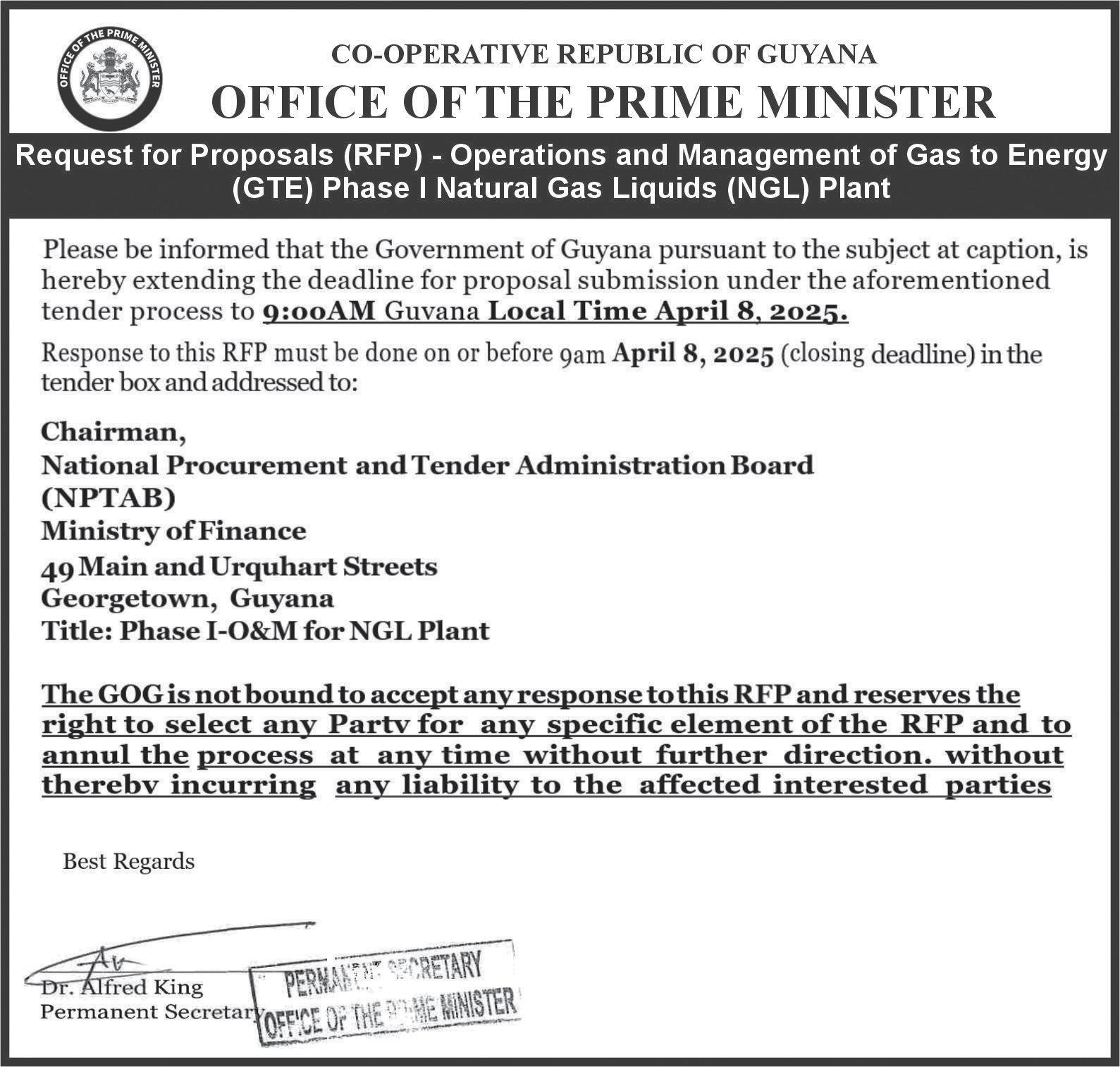

independence, as well as the court’s order [on the indication of provisional measures] of 1 December 2023”.
Similarly, Venezuela’s recent aggression occurred on March 1, 2025, around 07:00hrs, when Venezuelan Naval Vessel ABV Guaiqueiri sailed approximately 700 metres into Guyana’s exclusive economic zone (EEZ), near FPSO PROSPERITY. The Venezuelan naval vessel communicated threateningly via radio communication that FPSO PROSPERITY was operating in Venezuela’s EEZ before continuing in a Southwestern direction towards other FPSOs, to which it delivered the same message.
It is fitting that the incursion drew swift condemnation from the Guyana government, CARICOM, the Organization of American States (OAS), the Commonwealth, and key Western nations, including the U.S., the UK, and France.
Secondly, Rubio’s comment that Venezuela would be making a “big mistake” and risk the ire of not only Guyana but the U.S. is telling and significant. He is well aware of the situation with the controversy, and if not, the government certainly made sure of this.
His comment that ‘aggression and adventurism on the part of Venezuela’ will be met with consequences points to a chilling response that is already in the works should it display stubbornness. Venezuela would be miscalculating the strength of Guyana’s relations in the hemisphere and wider world, because it is a respected member of the regional and international community. It uses the diplomatic and judicial processes available to it to bring all disputes in-
volving countries such as Venezuela to a settlement.
That is why on March 29, 2018, Guyana filed an application instituting proceedings against Venezuela with respect to a controversy concerning “the legal validity and binding effect of the Award regarding the Boundary between the Colony of British Guiana and the United States of Venezuela, of 3 October 1899.”
A background to the matter and as basis for the jurisdiction of the court, the Applicant invokes Article IV, paragraph 2, of the “Agreement to Resolve the Controversy between Venezuela and the United Kingdom of Great Britain and Northern Ireland over the Frontier between Venezuela and British Guiana”, signed at Geneva on 17 February 1966, and the decision of 30 January 2018 by which the Secretary-General of the United Nations, in accordance with that Agreement, chose the court as the means to be used for the settlement of the controversy.
Some think that Rubio gave a strong rebuke to Venezuela on Wednesday and expressed hope for peace to reign while the matter is being adjudicated by the International Court of Justice.
Thirdly, President Ali’s remarks are fitting and welcomed by all Guyanese who stand against the Maduro regime. Ali reassured the U.S. that they would have a strengthened partnership with Guyana that is based upon mutual respect.
His position was largely adopted by Opposition Leader Aubrey Norton. He did not criticise it on Friday when he was asked a loaded question by a journalist at his weekly press conference.
He took issue, however, at a comment purportedly made by the Secretary of State and spent the time playing semantics.
Norton knows only too well that everything it says, Venezuela will use that against Guyana because they appear desperate and alone. This border controversy was never of utmost importance to the Venezuelans since there were so many other pressing issues such as the economic stagnation, which saw the country moving slowly into depression, political instability, poor governance, super-inflation and high cost of living.
The President, however, knows that Venezuelans do not want this fight, and so, he will have to temper his response and bring down the heat. President Ali has shown courage, empathy, strength and understanding, as well as a remarkable level of intelligence on the border controversy and building Guyana/US relations over the past four years.
Finally, the ball will have to be in Venezuela’s court. The next move will be pivotal, if any at all. Respect must be shown by Venezuela to international agreements, such as the Argyle Agreement, which has been disregarded time and time again. No one trusts Maduro and, by extension, Venezuela. Time will tell if Rubio’s remarks were effective and brought down the temperature, or caused the opposite. Tick Tock. Tick Tock!
DISCLAIMER: The views and opinions expressed in this column are solely those of the author and do not necessarily reflect the official policy or position of the Guyana National Newspapers Limited.
- Over 2,300 digital learning boxes distributed to families
- New channels will complement Guyana’s digital school, says President Ali
By Shaniya Harding
AS sectors like infrastructure, health, and security continue to grow, the Government of Guyana is also prioritising the nation’s future with the launch of six new digital channels on the Guyana Learning Channel (GLC).
Unveiled at the Leono-
toric, as the GLC has become the first Caribbean channel to adopt the ATSC standard, setting a new benchmark for educational television in the region. The boxes that were distributed act as a bridge between regular TV and ATSC-compliant standards, converting the digital signal into one that could be recognised by any
will go hand-in-hand with Guyana’s digital school.
As President Ali explained, the digital school will function similarly to a traditional school, but in an interactive Online format. Outlining the development of the project, he said, “The digital school will be an interactive school. It will be just like a normal school, but

ra Track and Field Centre, West Coast Demerara, on Saturday, these new channels represent more than just additional programmes; they mark a historic milestone in the development of a digitally enhanced education system designed to benefit all Guyanese.
The initiative, designed to provide equal access to high-quality educational content, saw some 2,350 boxes being distributed to families with children in Region Three (Essequibo Islands-West Demerara). The six new channels will cater for early learners, teens, and even lifelong learners, with channels GLC Elementary, GLC Elevate, GLC Discover, GLC Plus, GLC Teen ED and GLC Junior.
This move is also his-
television.
Speaking at the launch, President Dr. Irfaan Ali commended the Ministry of Education for its efforts in enhancing the digital platform, which he described as a critical tool for accessibility, innovation, and inclusivity in education.
“I want to congratulate the Ministry of Education on further improving the digital platform, through which accessibility to education, through which innovative approach to learning, and through which a dynamic learning environment is created to enhance learning, enhance capability, and importantly, to give a more even access to high-quality education across the country,” the President said. These new channels
on a digital platform.”
The Head of State further said, “We will have buildings to house the school. We have already identified one building in Region Six, one in Essequibo, and definitely, we’ll have one here in Region Three, where students will be attending the digital school. But the school will be accessible to every single child across the country.”
The digital education push will also incorporate a 360-degree assessment system, leveraging artificial intelligence (AI) to monitor and evaluate teacher performance, student engagement, and the overall effectiveness of teaching in Guyana.
“The other areas that the ministry would have to focus on is assessment,
360-degree assessment digitally, where students can assess teachers’ performance. Teachers can assess their peers’ performance, they can assess their principal’s performance on a digital platform that goes into an AI program that [will] tell us where our best teachers are, where our weaknesses are, and where we should concentrate resources on in addressing those weaknesses,” the President outlined.
One of the key benefits of the digital learning initiative is its ability to address teaching gaps and improve accountability within the education system. President Ali highlighted that even with highly-qualified teachers, issues such as absenteeism are hurdles for the education sector. The introduction of digital education tools will help bridge these gaps, and ensure consistent access to quality teaching materials, regardless of location.
“We have great teachers; excellent teachers, but you still hear and go to some schools that teachers may not turn up for a particular period, high levels of absenteeism. So, those are things that we have to address. But whilst we address it, these tools now
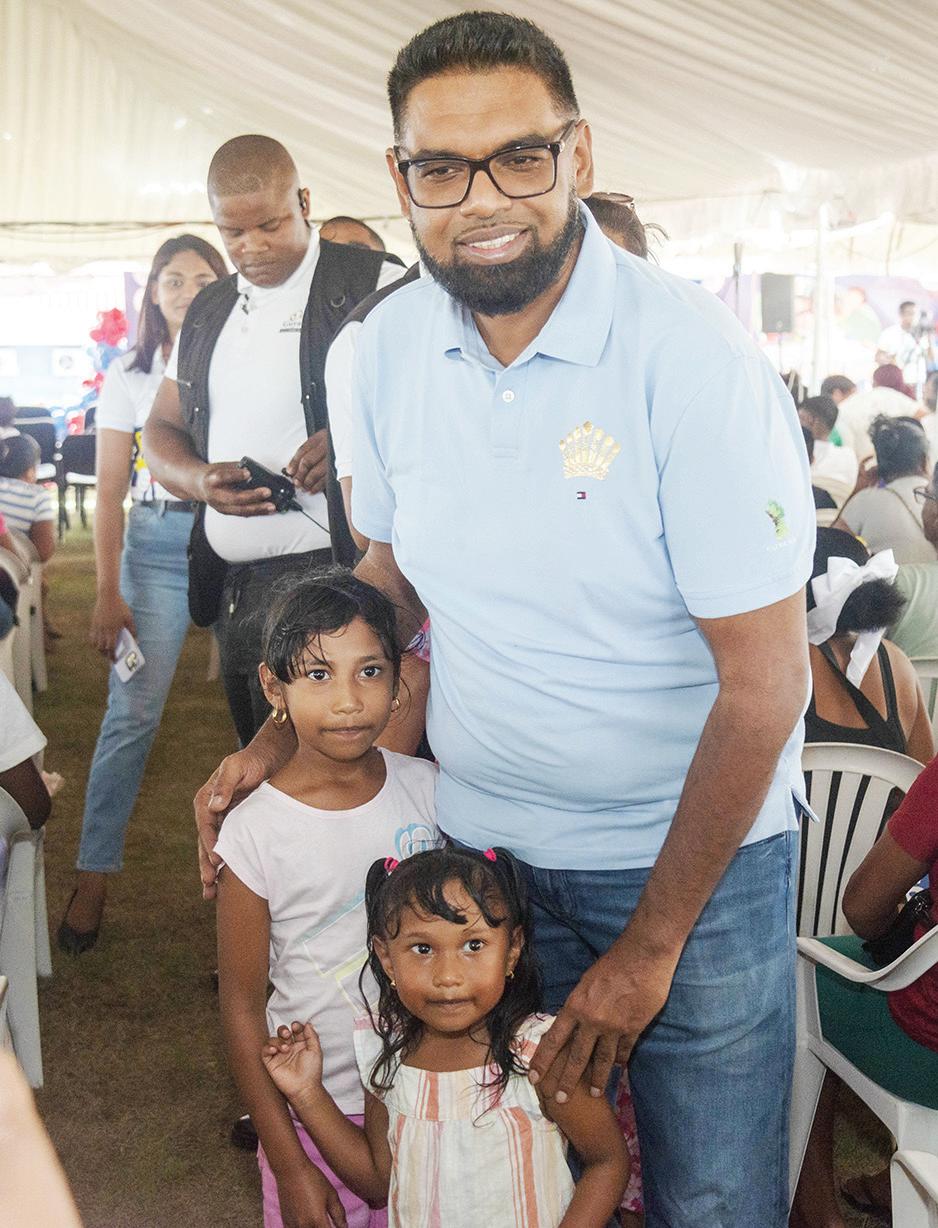
give us the opportunity not to be without teaching material, and not to have learning gaps.
Also speaking at the event, Minister of Education Priya Manickchand echoed the President’s sentiments, emphasising the importance of equitable education access. She highlighted the origin of the Learning Channel in 2011 under then-President Bharrat Jagdeo’s leadership, noting that the initiative was designed to ensure that students, regardless of their location or financial status, could access quality education.
Furthermore, the initiative builds on Guyana’s past success in maintaining access to education during the COVID-19 pandemic, when Guyana was one of the few countries in the region that could have maintained learning through the Guyana Learning Channel.
Minister Manickchand also criticised the previous administration for shifting the channel’s focus away
from education, stating that under the APNU-AFC government, political content replaced educational material.
“When I came into office in 2020, I was really disappointed to see that Guyana, the only country in the Caribbean with a television channel dedicated to teaching and learning, had done nothing on that channel to disseminate information; had done nothing on that channel to teach our babies, had done nothing on that channel to prepare us for exams,” she said.
Since 2020, the Ministry of Education has been working to restore and expand the channel’s educational content, ensuring that students from nursery to secondary have access to a full curriculum. The new six-channel expansion will further enhance the delivery of education, with dedicated channels for various levels and subjects.

By Trina Williams
PRESIDENT, Dr Irfaan Ali has announced that the housing backlog in Region Three (Essequibo Islands-West Demerara) will be eliminated and applicants will receive their provisional allocations by the end of September.
During a public meeting at La Grange Village, West Bank Demerara, on Saturday, the Head of State said, “Before the end of September every single person who applied up to the end of 2024 will receive a letter for provisional allocation in Region Three…We will clear the backlog in Region Three completely.”
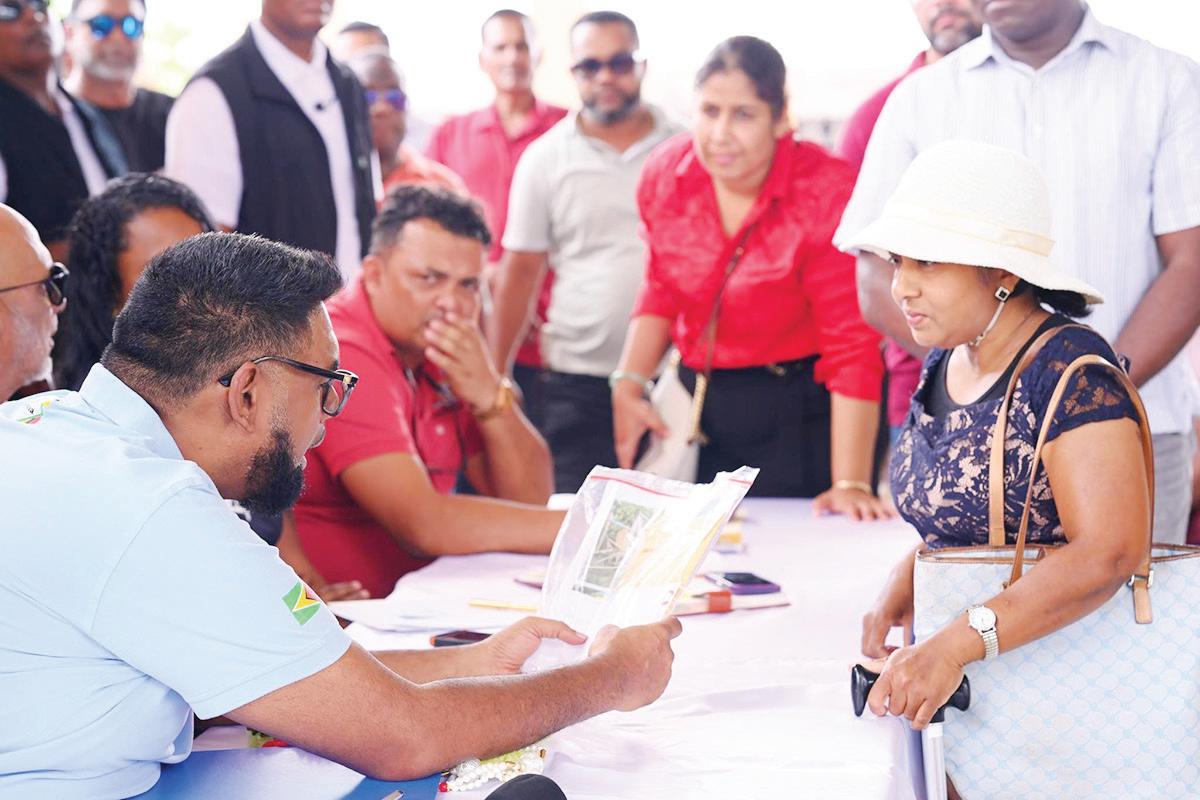
come, moderate-income, middle-income and high-income housing development for young professionals.”
With the projected allocation of three times the initial 10,000 house-lot allocation target this year alone, the government is well on its way to surpassing its overall target of 50,000 house lots before the end of 2025.
According to the minister, this achievement is a result of strategic planning, infrastructural development and increased investments in the housing sector.
He said that house lots will be distributed in all 10 administrative regions. Providing a breakdown of allocations, Minister Croal stated that in 2020, 2,759 house lots were distributed, followed by 6,989 in 2021, 10,695 in 2022, and 9,056 in 2023. A record-breaking 10,797 house lots were distributed in 2024.
The President received a resounding applause with chants of “a second term,” from residents. He noted that the lands the opposition gave away to their associates have been repossessed and will be handed to the ordinary Guyanese.
3,000/4,000 families,” the President said.
“The same land that they gave their friends 3,000/4,000 acres, we’re taking it back to give
In Region Three, he said that the government has spent almost $65 billion to develop the housing sector.

“Since we came into government, almost 21,000 acres of land was developed for housing, more than 90 per cent of which went directly to low-in -
“In keeping with our Manifesto commitment, we have 10,000 house lots remaining [to be allocated], but we can do more, and we are going to do more. And we will triple this; we will do this by 300 per cent. As a result, we have been able to move beyond the 10,000. In our engagements with the various regions, we have been able to come up with our target…,” Minister of Housing and Water Collin Croal previously noted.
Since taking office, the government has prioritised home-ownership opportunities for citizens, particularly lowand middle-income families. Several initiatives have been undertaken to ensure an increase in the rate of housing development throughout the country.

THE unilateral decision by the Opposition-controlled City Council to implement a financial regulation aimed at waiving interest on outstanding rates and taxes within the capital city has been flagged by People’s Progressive Party (PPP) councillors.
Aside from underscoring its illegality, several PPP councillors have responded to APNU councillor Lelon Saul’s letter, in which he defended the actions of the council.
PPP councillor Steven Jacobs has highlighted several implications of the recent action by the Georgetown Mayor and City Council (M&CC).
The councillor pointed to Section 146 of the Municipal and District Councils Act, which states, “The Minister may make financial regulations for controlling and managing financial business of councils,” and underscored that this section is unequivocal and delineates who holds the authority.
“For this reason, Councillor Saul and Mayor Mentore were both challenged on the legality of this new policy, while it was explicitly stated that there were no objections to assisting citizens facing financial hardships, provided it is done within the confines of the law,” Jacobs posited.
Jacobs also mentioned that although 40 percent of property owners are in arrears, it is the council's responsibility to ensure the continued success of its awareness programme. The results of this initiative are already evident, as over 400 citizens, previously classified as delinquent for not paying in the last three years, have begun making their payments in January or February, according to reports.
He said: “This blatant attempt to shift blame or to
so compassionately appeal to the minister is nothing but duplicity, as this suggestion was already made in our statutory council meeting and, of course, shot down by Mayor Mentore as he lamented ‘Executive Powers of the council.’
“It is paramount that the citizens of Georgetown be led by well-oiled and right-thinking councillors who endeavour to implement measures in good faith with a common purpose to provide a result in which everyone will be satisfied, not presenting themselves as saviours with ulterior motives for personal benefits.”
Additionally, PPP councillor Alfonso De-Armas-Archbold flayed Saul for his grandstanding.
“This is not a question of nuance – it is a question of transparency and accountability,” the councillor affirmed.
He said it is important to understand that Georgetown is not in the midst of a humanitarian catastrophe.
“Saul’s grandstanding, therefore, is a strawman built to justify lawlessness. The Council could have applied for ministerial approval for a waiver programme, as provided for in law. Instead, they opted for political theatre – choosing to use the citizens of Georgetown as pawns in their ill-conceived scheme,” he said.
De-Armas-Archbold is convinced that the goal was not to protect the most vulnerable – it was to score political points. Further, PPP councillor Jai Narine Singh said the M&CC should have followed the law.
He then underscored the nature of the Opposition-controlled council, describing it as: “This bullyism of rushing through things and stamping authority because they have the majority at the council.”
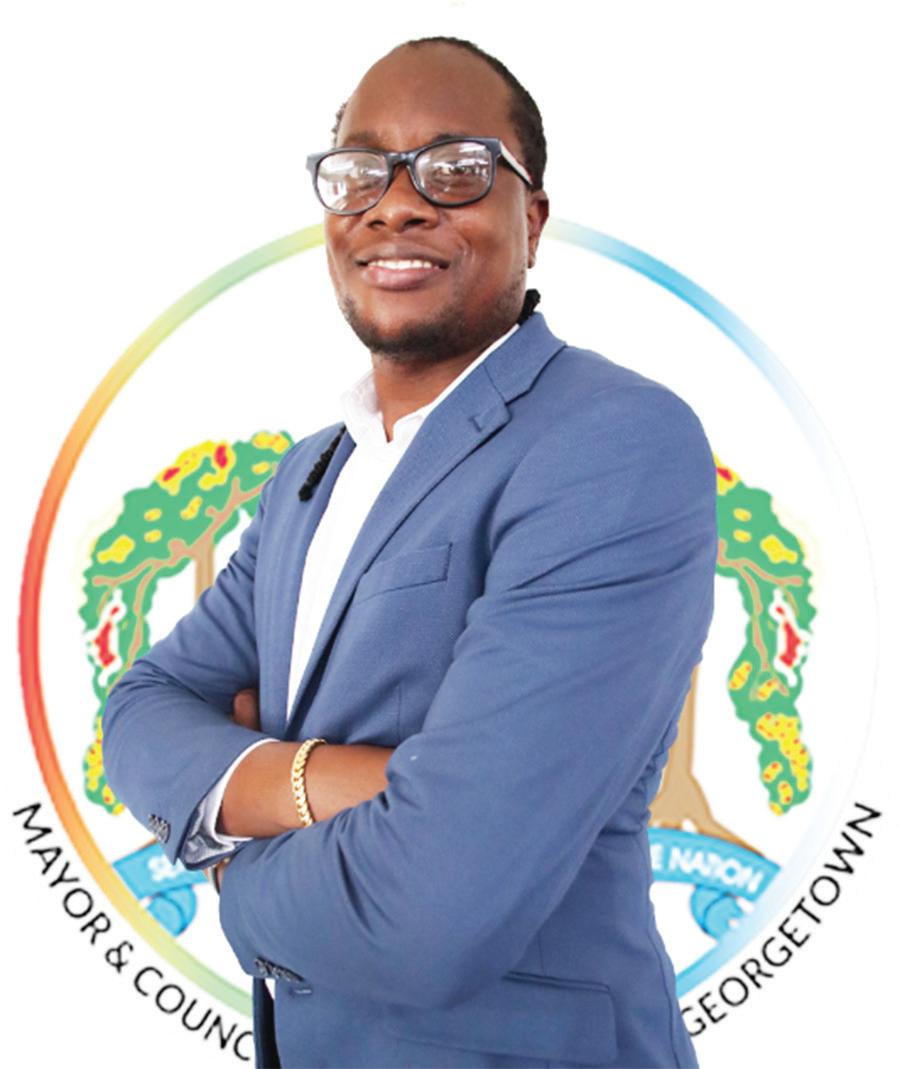
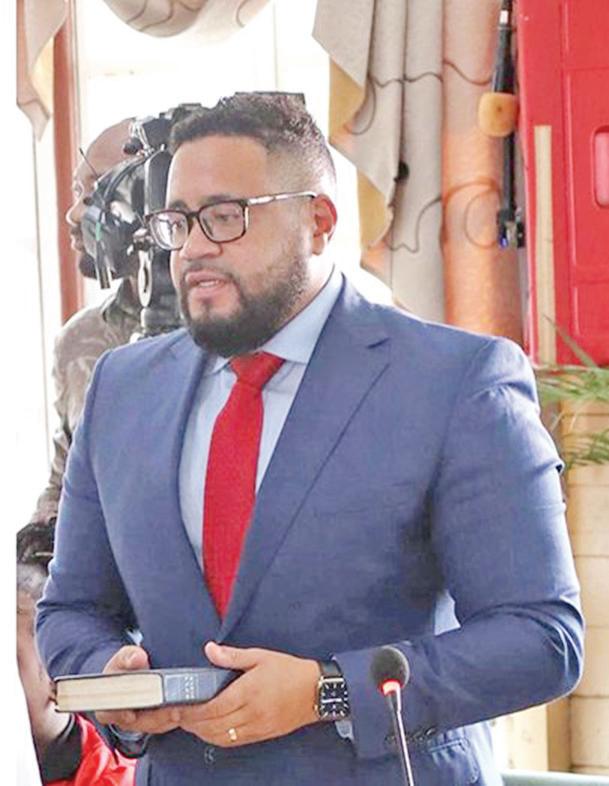
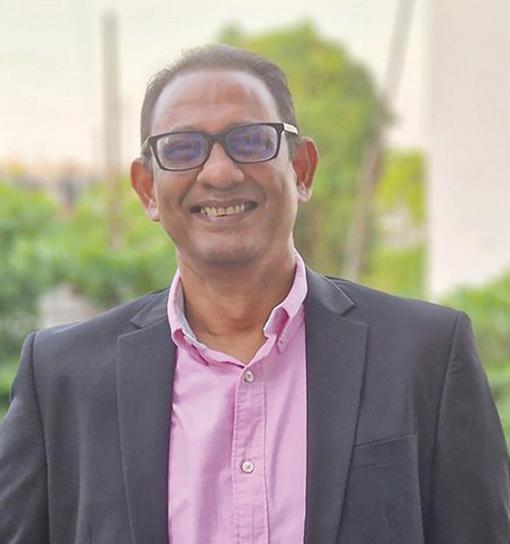

GENERAL Secretary of the People’s Progressive Party (PPP) and Guyana’s Vice President, Bharrat Jagdeo has denounced all forms of violence. During a press conference on Thursday at Freedom House, he told reporters: “We condemn violence in all its forms – political violence or any form of violence. There should be no violence in the way we conduct our business.”
He added: “People are free to talk what they want, they are free to protest, but there must be no violence.”
The ERC, in a press release, noted that it is cognisant of various public discourses taking place on and offline, some of which have led to ethnic and political tensions. The ERC, as such, denounced all acts that seek to undermine peace, respect, and understanding in our nation.
Guided by historical lessons of turbulent elections, the ERC reminded all citizens, regardless of political affiliation, to exercise restraint, engage in dialogue, and reject any form of hostility or divisiveness that threatens national harmony.
The ERC firmly called on leaders, supporters and all involved in public discourse, both in person and online, to
Meanwhile, the Ethnic Relations Commission (ERC) has noted concerns over escalating tensions in several communities, calling for calm ahead of the upcoming General and Regional Elections.
uphold the principles of peace, unity, and respect for diversity. Political discourse must never lead to ethnic divisions or conflict among our people.
“The Commission remains committed to its mandate of promoting ethnic harmony and stands ready to work with all stakeholders to ensure national unity. We urge all Guyanese to reject inflammatory rhetoric and behaviour that could heighten tensions and instead work toward strengthening the bonds of brotherhood and national unity.
“Let us move forward together, upholding the values of peace, respect, and understanding as we promote harmony and good relations,” the ERC said.
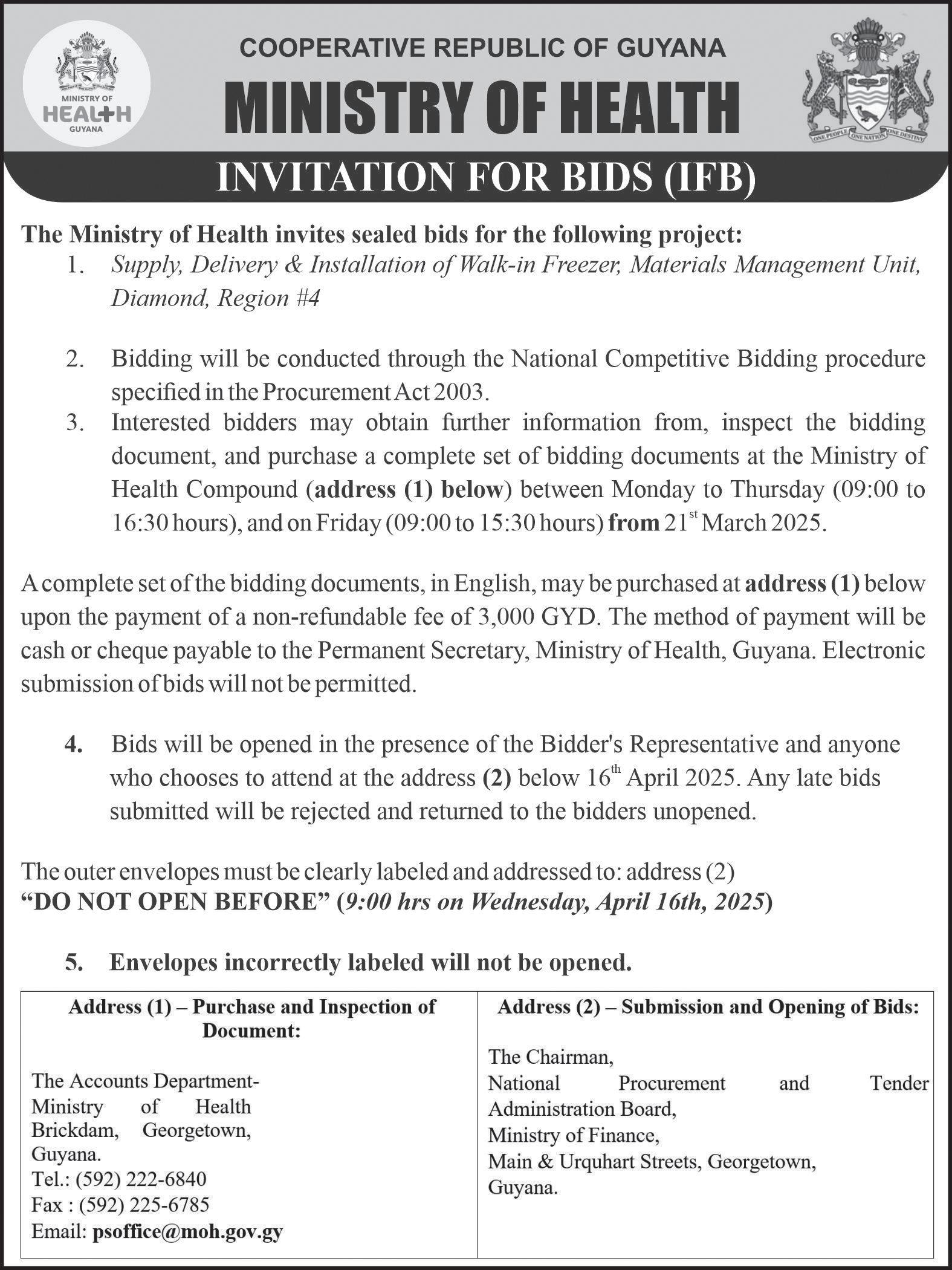
Allan Wilson, presiding at the Mahaicony Magistrate’s Court, has dismissed the drug trafficking charge against Ramlall Ramdihal, following a submission from defence counsel that no prima facie case had been established against the accused.
Ramdihal, a 38-yearold field supervisor from Bath Settlement, West Coast Berbice (WCB), had been arrested after police discovered 92 pounds (41.768 kilogrammes) of cannabis in his vehicle.
Defence counsel, Bernard Da Silva, argued that the prosecution had failed to provide sufficient evidence for the charge of trafficking in narcotics to stand.
In his written submission, Da Silva referred to past judicial precedents, noting that when determining whether or not the prima facie case can be made out, the court is to consider the case as a whole and not look merely at the individual evidential links.
He referred to the ruling in State v Gowkarran Persaud et al. (1976), 24 WIR 97, where it was established that a general view of the evidence was to be taken into account.
Further evidence in support of his argument, Da Silva also referenced R v Galbraith (1981) 2 All ER 1060, highlighting that
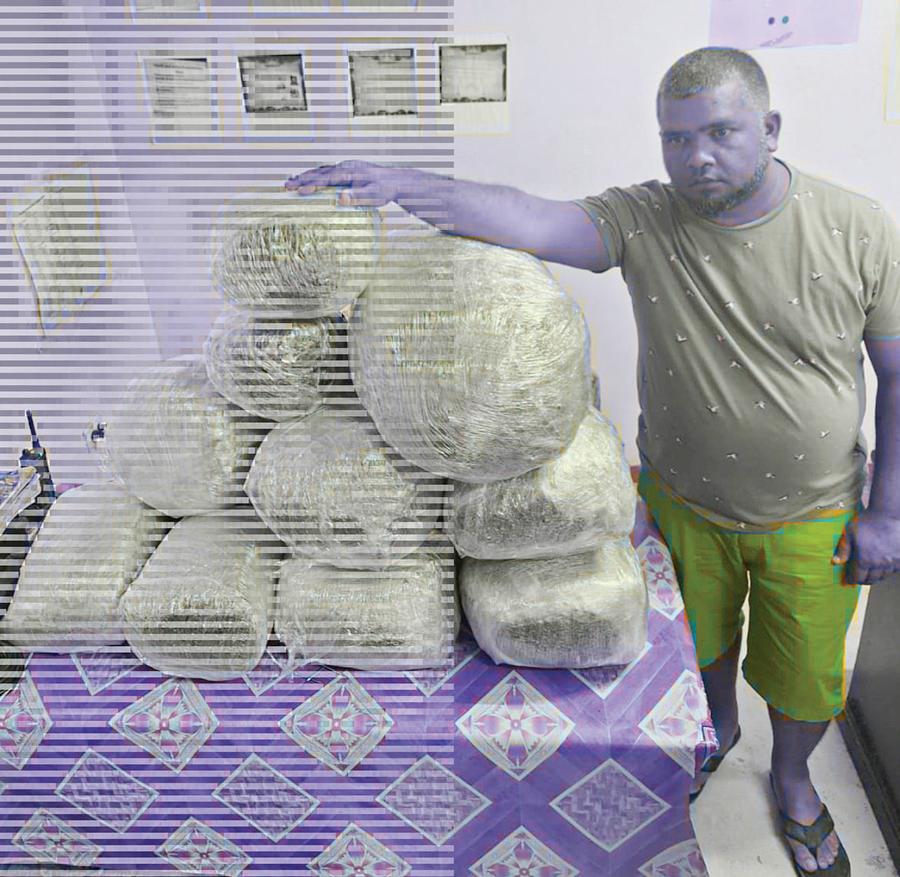
the prosecution's evidence provided, if taken at best, was not reliable.
He contended that, as much as the prosecution tried, the evidence fell short of the required standard for a prima facie case and thus his request that the charge be dismissed.
Despite the prosecution's efforts to present its case, the Magistrate’s decision to dismiss the charge came after Da Silva's successful argument that there was insufficient evidence for the case to proceed. The Magistrate upheld the defence's submission that a prima facie case had not been made out, leading to the dismissal of the trafficking charge.
The issue was sparked when Ramdihal was taken into custody on February 8, 2024, in the evening when he was caught
parked on the south side of Now or Never Public Road, Mahaicony, East Coast Demerara (ECD). Ramdihal, according to reports from the police, could not provide a reasonable explanation for his presence at the location.
A search of his vehicle, a white car with the registration number PVV 1495, led to the discovery of three bulky white salt bags in the trunk, which contained parcels wrapped in plastic that tested positive for cannabis. Ramdihal allegedly claimed that he had been instructed to pick up the bags at No. 30 Village, West Coast Berbice (WCB), and deliver them to Georgetown for payment. However, he refused to disclose who had given him the bags.

By Feona Morrison
THE High Court in Demerara has ruled on lawsuits filed by retired Justices Brassington Reynolds and Franklyn Holder, who alleged that the Guyana Government unfairly withheld a retroactive salary increase granted to public servants up to December 2021.
The case sparked public debate, with accusations that the government’s actions were discriminatory against the two Afro-Guyanese judges.
Attorney General and Minister of Legal Affairs, Anil Nandlall, SC, addressed the controversy on his weekly programme, Issues in the News, where he refuted claims of racial bias. He explained that while Justice Holder was unsuccessful in his claim, Justice Reynolds secured a partial victory. When these proceedings were filed, the Attorney General said they received widespread media coverage, prompting public criticism of the government. According to him, there were allegations that the government was wrong for not paying the retired judges and accused it of attempting to stifle judges.
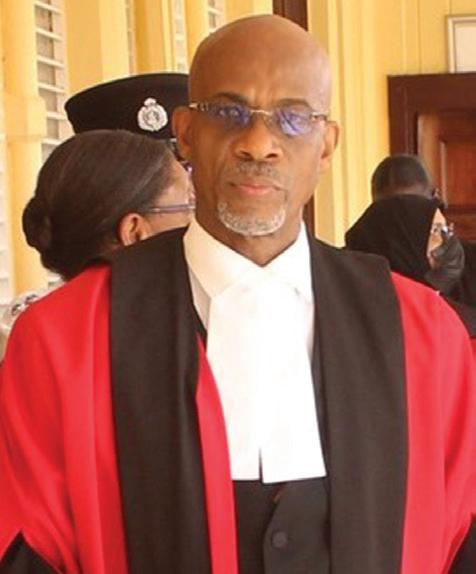
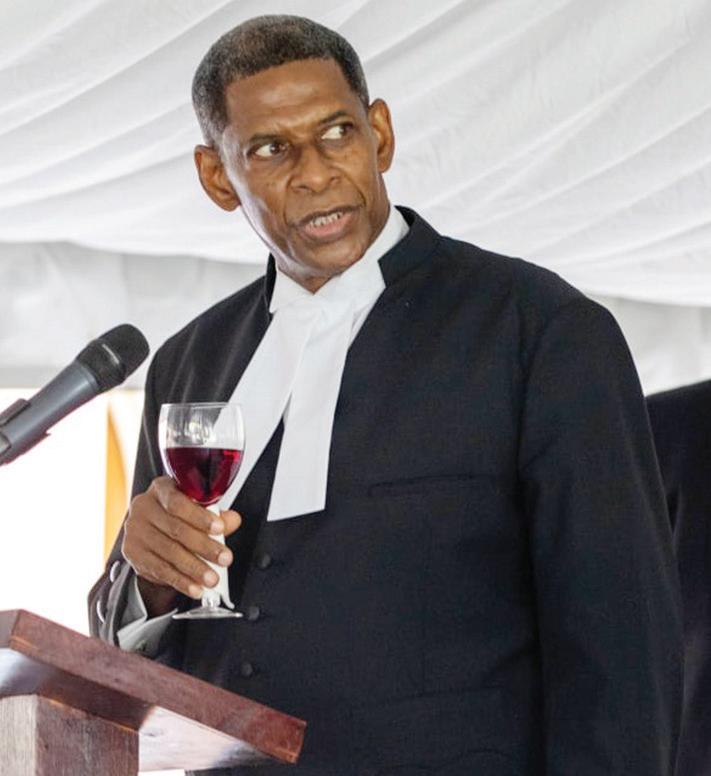
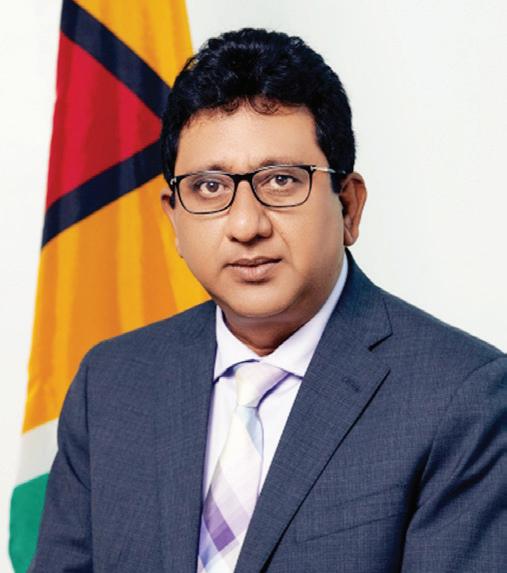
“In fact, one set of criticisms was to the effect that this was some form of racial discrimination—that these were two Afro-Guyanese judges being discriminated against. We defended the case; they had a very experienced and respected lawyer…and they did not succeed in the claims they had filed. One of them failed completely, and the other was marginally successful. In fact, we conceded that he was entitled to the reliefs,” he said
Both judges requested the High Court to order that they be entitled to a monthly pension of $819,556, rather than their current pension of $758,849.
Justice Reynolds further
sought a court order directing the State to pay him a total of $5,132,010, which includes $1,161,160 in outstanding salary for January to December 2022; $2,639,000 in unpaid gratuity; $57,003 in pension arrears for December 2022; $728,484 in pension arrears for 2023, and $546,363 in pension arrears for January to September 2024.
Justice Reynolds was granted partial relief, with the court ruling that he was entitled to a retroactive salary increase because he was still on the payroll at the time the government issued the salary increase order. As a result, he will receive an increase retroactive to January 1 of the year of his retirement. However, the court found that
his pensions were properly commuted, meaning that his claim for a higher pension was denied.
Justice Holder, on the other hand, sought a court order for the payment of $ 5,034,896, comprising $950,040 in outstanding salary for January to September 2022; $2,639,000 in unpaid gratuity; $171,009 in pension arrears for October to December 2022; $728,484 in pension arrears for 2023, and $546,363 in pension arrears for January to September 2024.
Nandlall said: “The judge who decided the case found that this particular judge
did not make out a case for the reliefs. In other words, he did not make out a case that he was entitled to any retroactive emoluments, and consequently, he is not entitled to any consequential increase in pension. So, the State committed no error in relation to the computation of his benefits.”
The lawsuits were filed in October 2024 by Senior Counsel Stephen Fraser and attorney Shantel Scott-Lall. The retired judges had argued that the government's failure to pay them the retroactive salary increase violated the Constitutional Offices (Remuneration of Holders) Order and contravened their constitutional right to pension and superannuation benefits.
They also challenged the legitimacy of Finance Circular No. 11/2022, which limited the eight percent increase to public servants, staff of constitutional agencies, and members of the Disciplined Services who were employed up to December 31, 2022.
The retired judges contended that the restriction was unconstitutional and
that they had a legitimate expectation of receiving the retroactive increase. The former judges also sought a court order declaring that the failure to pay them the retroactive salary increase breaches their legitimate expectation of receiving the increase on their salary as of December 31, 2021. They also requested damages in excess of $100,000. The respondents in the matter included the Attorney General, the Judicial Service Commission (JSC), Senior Minister in the Office of the President with responsibility for Finance Dr. Ashni Singh, Finance Secretary Sukrishalall Pasha, and Principal Assistant Secretary of the Finance Department of the Supreme Court, Asaf Alli. With the High Court’s ruling, the government has been vindicated in its decision regarding Justice Holder’s benefits, while Justice Reynolds will receive partial payments in accordance with the ruling. However, Nandlall stated that the State has filed an appeal in relation to both cases.
DURING a recent community outreach on the Corentyne, Minister of Natural Resources, Vickram Bharrat underscored the ongoing transformation of Berbice and the continuous improvements in the lives of its residents. He emphasised that regional development remains a top priority, with numerous initiatives and projects driving economic growth, upgrading infrastructure, and creating enhanced opportunities for citizens.
He also reaffirmed the government’s commitment to fostering sustainable progress, ensuring that Berbice continues to thrive as a key region in the country’s development. He said, “Our country and our people are developing and are progressing, people are doing much better than they did before.”
He added, “I’m sure if I were to ask you if your life has improved in the last four years you would tell me yes that you would have benefitted in some way or the other, whether you got a house lot through the government housing programme, whether
someone for you is studying through the GOAL scholarship, whether someone from your family is going to the University of Guyana free now, whether you collected your cash grant, whether the healthcare in Berbice has improved, whether the education system and our children is doing better, has improved, our children are receiving their cash grant once again, that is what we would have done over the last four years.”
According to him, a born Berbician, at one point in Berbice, the only “good road used to be this public road”; however, the current administration has worked to improve infrastructure and roads within every community. “Look at the transformation today and sometimes we need to reflect on the past to appreciate where we are today and also to know the direction in which we are going as a country.”
He noted that in the past, residents would often sell their property to seek opportunities abroad, but now, due to the ongoing development in Guyana, many
are choosing to return rather than leave. "These changes are happening in our country, and it has transformed so significantly that at times we may take it for granted," he remarked.
He further highlighted that oil and gas have brought significant positive attention to Guyana, stating, "The reality is, our lives, our communities, and our country have undergone a transformation, and this is just the beginning."
Additionally, Minister Bharrat encouraged those gathered at the community meeting in Number 54 Village, Corentyne, to take pride in Guyana’s progress and the positive transformations taking place across the country. He urged citizens to embrace a sense of patriotism as he emphasised that national development is a collective effort.
Minister Bharrat also assured residents that investments in infrastructure, education, healthcare, and economic opportunities will persist as he further stressed that development will continue in every part of Guyana.
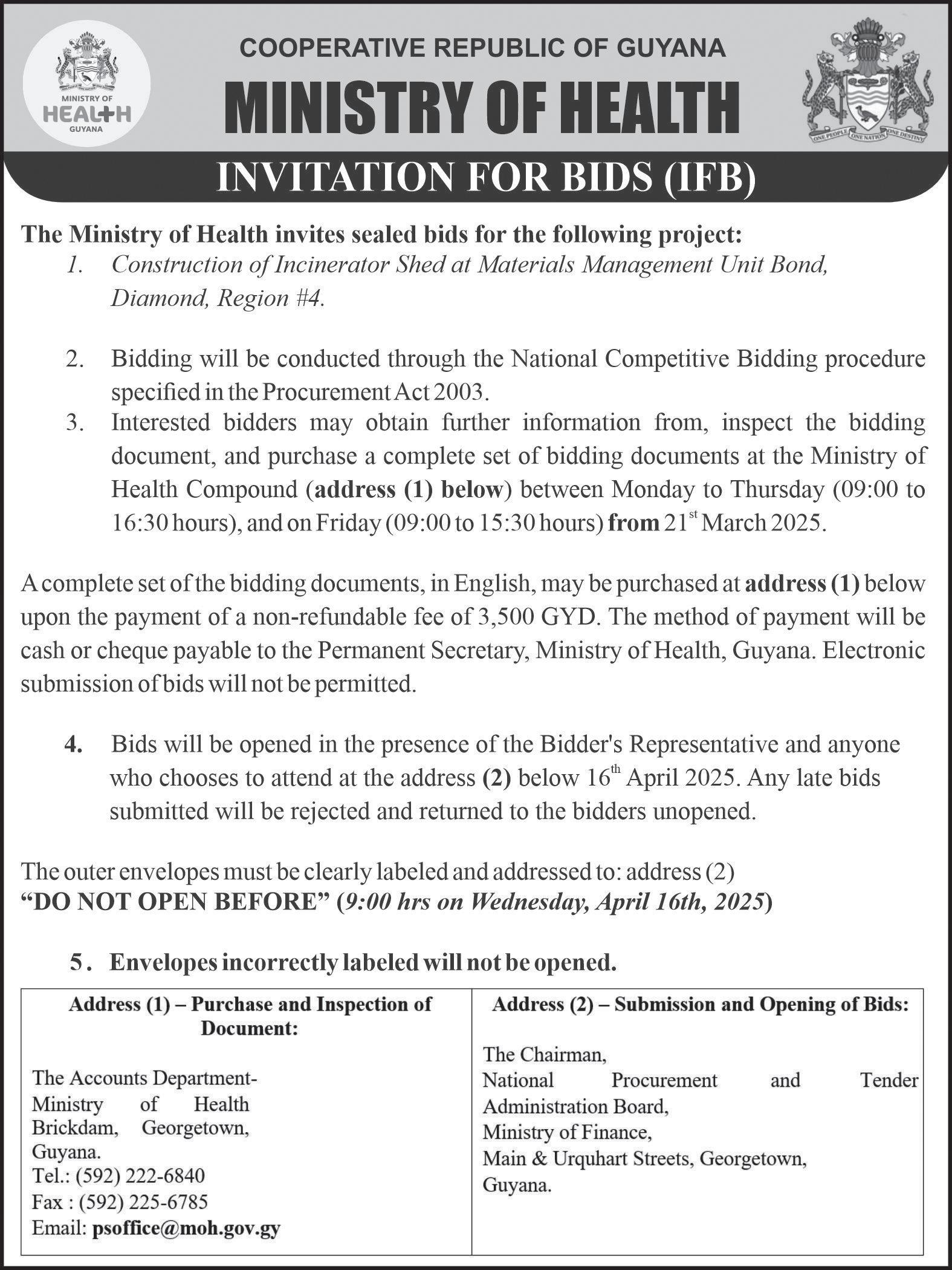




ENGLISH RACING TIPS
IT was a Mark Chapman show in Napier as the Kiwi scored an unbeaten 132 (111), setting the base for New Zealand's victory by 73 runs in the first ODI against Pakistan.
The century was the third of Chapman's ODI career and his highest score in the format so far.
Pakistan ODI skipper Mohammed Rizwan won the toss and elected to field first, which seemed like a success at first.
The Napier pitch was proving friendly to the bowlers as the New Zealand top-order fell apart to the pace of Naseem Shah and Akif Javed. Openers Will Young and Nick Kelly perished inside the Powerplay, as did Henry Nicholls soon after.
At 50/3, it was Mark Chapman and Darryl Mitchell who came to New Zealand's rescue with an incredible stand of 199 runs.
Mark Chapman was the aggressor as he smashed 13 fours and 6 sixes in his innings of 132 at a strike rate of 118.91, with Darry Mitchell playing a solid sec-
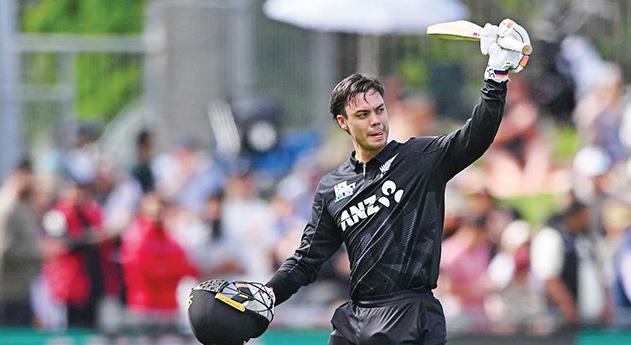
ond fiddle with a calm 76 off 84 balls with 4 fours and 4 sixes.
Debutant Muhammad Abbas finished with a flurry, with a quickfire 26-ball 52 to take New Zealand to 344/9 in their 50 overs.
In the second innings, the Pakistan openers made a good start with a stand of 83, when Nathan Smith dispatched the dangerous Usman Khan for 39.
Abdullah Shafique (36) followed his opening partner soon after when stand-in New Zealand skipper Michael Bracewell struck in his first over.
Former Pakistan captain
Babar Azam (78) and T20I skipper Salman Agha (58) were in fine touch as they guided Pakistan to 249/4, while skipper Mohammed Rizwan (30) too chipped in with handy runs.
However, it proved to be an innings of two halves for Pakistan as they went on to lose three quick wickets to go from 249/3 in the 39th over to 253/6 in the 40th over.
This minor collapse gave New Zealand an opening as Nathan Smith ran through the Pakistan lower-order and bowled them out for 271 in the 45th over.
Smith was the pick of
Gujarat Titans’ thumping 36-run win over Mumbai Indians was the story of the night at Narendra Modi Stadium in Ahmedabad.
Despite being played at the same venue as their previous outing, tonight’s pitch offered a different recipe with its different clay, a patchy, two-paced surface that demanded a more thoughtful approach rather than sheer power.
Put into bat first, the Titans began their innings with measured intent, with openers Shubman Gill and Sai Sudharsan steadily building a platform on a surface that was clearly less conducive to a high-scoring extravaganza.
The duo took a balanced approach understanding tonight’s pitch would be a little on the slower side compared to the one from the first game and worked on building a solid foundation, working the ball into gaps, ensuring the scoreboard kept ticking.
At the end of the pow-
erplay, GT managed to put together a respectable total of 66/0, with Sudharsan and Gill both contributing 32 runs each. Their strategic approach allowed them to conserve wickets setting up a platform for a more expansive middle overs assault.
However, as the match moved past the halfway stage, the dynamics shifted. The Titans lost two key wickets, skipper Shubman Gill, who had played a pivotal role in setting the tone, was caught by Naman Dhir off Hardik Pandya, departing for 38 and soon after Jos Buttler, who had been contributing briskly, was caught by Rickelton off Mujeeb Ur Rahman for 39, applying the breaks when the Titans’ were scoring freely.
A few useful hits from the lower middle order meant GT were able to finish at a formidable 196 for 8 in their 20 overs.
In return, Rohit Sharma went from the word go scoring two fours leaving MI
best figures of
fans on their feet but their celebration was short-lived as Mohammed Siraj claimed his wicket. Siraj quickly struck once in the powerplay giving the Titans the early upper hand.
Tilak Varma along with Surya Kumar Yadav took charge, attempting to rebuild the innings but Prasidh Krishna turned the tide dismissing Tilak for 39 off 36 balls and soon thereafter also dismissed Surya Kumar Yadav.
As wickets tumbled, MI’s innings started to resemble a sunken ship. With key partnerships disintegrating and the required run rate creeping up, MI found it hard to get back on track managing just 160/6 in their 20 overs. This loss means Mumbai has faced its second defeat in a row in the ongoing season while Gujarat came back from a loss to move up third in the points table.
(IPLT20)
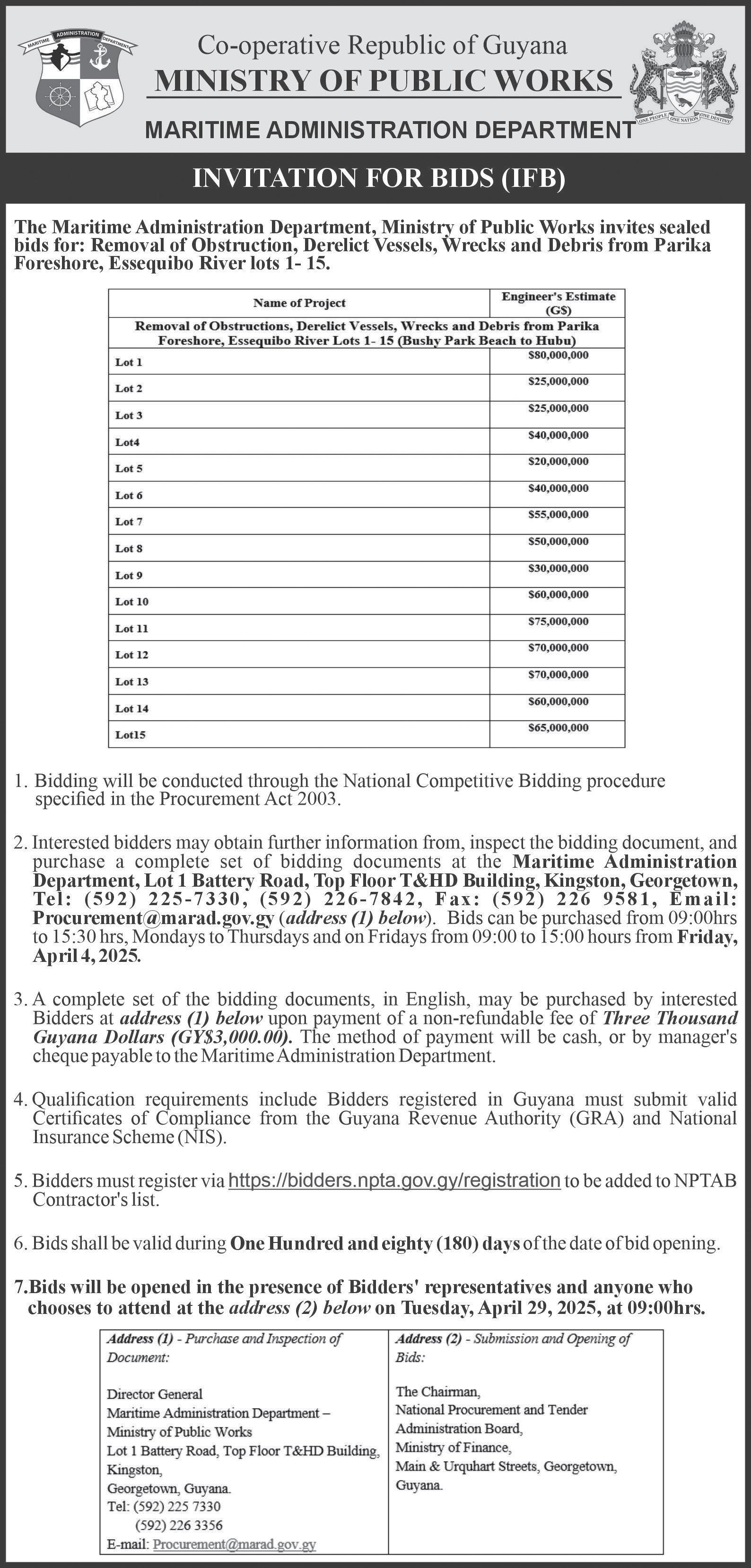
Eoin Morgan says England could make a "left-field call" with their new whiteball captaincy and create an arrangement where Test skipper Ben Stokes is parachuted in to do the job for major tournaments.
England are looking for a new captain for the men's one-day and T20 sides after Jos Buttler resigned following their early exit in the Champions Trophy.
Morgan, who skippered England to 50-over World Cup glory in 2019, has suggested a scenario where a "lieutenant" of Stokes' holds the reins for the vast majority of bilateral series with the
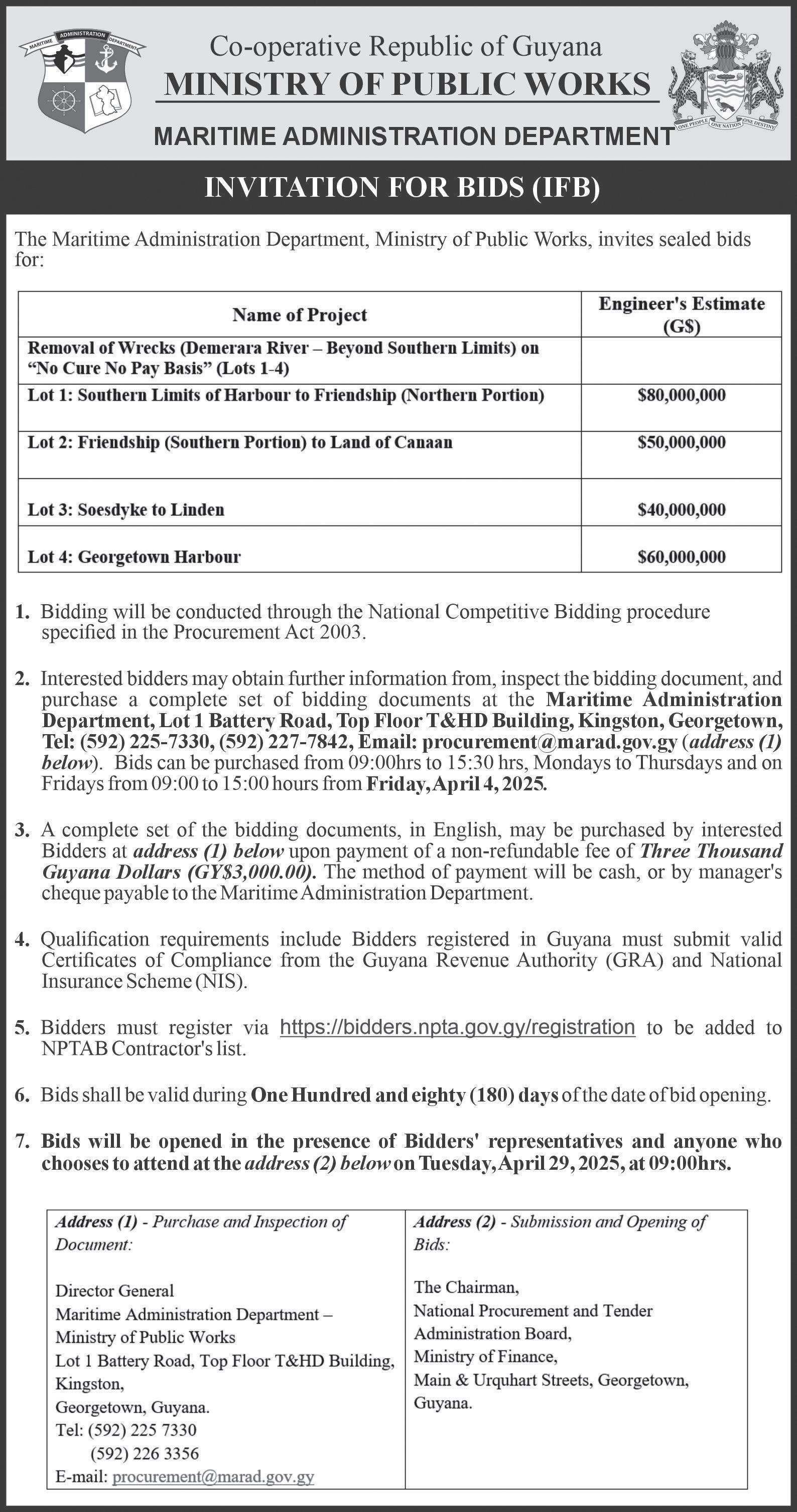

Ben
red-ball skipper brought back for World Cups.
England director of men's cricket Rob Key said earlier this month it would be "stupid" not to consider Stokes as a white-ball captain.
Stokes, 33, has been Test captain since 2022 but the all-rounder has not played white-ball cricket for England since the 2023 50-over World Cup.
"I think a bit of a leftfield call would be to ask Ben Stokes to consider the
role, not necessarily on a fulltime basis," Morgan told Sky Sports, external.
"You would have to create an environment where Ben would slip in and out seamlessly in preparation for big tournaments and then sit on the backburner and focus on Test match cricket until those big tournaments came up.
"Everyone would have to be on the same page about how it might work."
Experienced England bat-
ter Joe Root has already ruled out becoming England's next limited-overs captain but Harry Brook is among those under consideration.
Morgan was impressed with the manner in which Brook skippered England's white-ball side against Australia last summer while Buttler was absent because of injury.
Morgan, who played 225 ODIs and 115 T20 Internationals for England, said the "leadership role didn't seem to weigh" on Brook and he was one of the "options" on the table depending on the "direction they want to take".
"If you highlight something that's in three years, four years, somebody like Harry Brook would do a magnificent job," Morgan, 38, said.
"He had the captaincy at the end of our summer last year against a really strong Australian side and I thought he was impressive." (BBC Sport)
Botafago and Silver Shattas recorded resounding victories on the opening night of the Mice and Jermaine $1.4M Linden futsal tournament which kicked off Friday night at the Retrieve Hard Court in the mining town.
With thirteen clubs playing in four groups, the preliminary round began with Botafago winning the opening game with an impressive 6-4 victory over Hi Stars as Jashawn Moore and Jamal Haynes recorded doubles and Donovan Francis and Omar Brewley had single strikes.
Keona Lowe had a brace for Hi Stars while Lennox Paul and Joshua with one goal each accounted for Hi Stars goals.
In the other game of the night Silver Shattas outscored Amelia’s Ward Panthers 7-3.
The Shattas were led by Jamaine Samuels and Omar Williams both scoring twice, as Jonah Simon, Jehu Regis and Omar Samuels were with one apiece.
Paul Trotman, Nico
The tournament continued last night (Saturday)
$400,000 and third place finisher $200,000 as fourth position collects $100,000 with the MVP of the final winning a motorcycle.

Action in Botafago and Hi Stars game on opening night of Mice and Jermaine Futsal tournament
with three more group stage matches, while it resumes next Friday at the same venue with another triple- header.
At stake in this tournament is $700,000 for the winners.
The losing finalist gets
Trophies are also at stake and the sponsors are Crown Nation Auto Sales, Bella’s Lumber Yard, Scotty’s General Store and Sky Tech. The final is set for Saturday April 20 at the Retrieve Hard Court. (Joe Chapman)
KEMOL Savory, one of the bedrocks of the Guyana Harpy Eagles' middle order, radiates confidence as he sets his sights on a crucial contribution in the final two rounds of the West Indies Four-Day Championship.
With a stellar 50-plus average this season, the lefthander has become a linchpin for the Eagles, seamlessly blending batting prowess with leadership duties and, when required, donning the wicketkeeping gloves.
While a century has eluded him, Savory's impact has been undeniable.
"It's been going good. I'm in a good space," Savory revealed to News Room Sport, as the Eagles brace for two pivotal encounters
that could decide their title fate.
His 273 runs from seven innings, including a nearmiss 99 against Barbados Pride, highlight his consistency. Savory remains upbeat despite falling agonisingly short of fifties against Jamaica Scorpions and Windward Islands Volcanoes.
"You said earlier I missed out on a hundred, but at the same time, it's about taking the positives away from that (knock). I've been getting some good starts and it's just a matter of time (before those hundreds come)," he explained to News Room, focusing on his reliable contributions.
Savory's first-class pedigree, boasting two centu-
ries and a 39.57 average, is well-established. His form transcends formats, as evidenced by his consecutive unbeaten fifties in last season's Regional Super50.
His batting philosophy is refreshingly simple: "It's just about sticking to the basics because, at the end of the day, it's cricket. Four-day cricket is about patience."
His consistent performances have propelled the Harpy Eagles to the table's summit.
With a potentially decisive clash against Trinidad and Tobago Red Force looming, Savory is determined to maintain his composure and play a pivotal role in securing the title.
FROM PAGE 23
scalps,
It was a tense tussle from thereon but with Boodie completing a fine all-round performance by grabbing three for 12 from 1.2 overs to “clean up” the tail, Officers hopes went abegging. Ramkarran, who was mainly responsible for the middle-order collapse, ended with four for 21 from his four overs.
Earlier, the Tactical Services Unit (TSU) chased down the challenging 197 with relative ease to claim the third place despite a brilliant century from Region 2’s Lance Roberts, the lone hundred in the tournament.
Collis Burnett dominated a fine opening stand of 86 with Alex Burnett, who contributed 16 while the former
who hit a top score of 64 blasted four fours and an equal number of sixes.
National player, Anthony Adams, who batted at number three, also joined in the fun and was there at the end when victory was achieved, his unbeaten 53, laced with four fours and three sixes. He also added a valuable 46 for the fourth wicket with Ackim Welcome who hit 23 with two fours and two sixes. Reon Venture ended with two for 42.
Roberts had earlier given his team some hope with his blistering 109, which was decorated with five fours and nine huge sixes. Damion Vantull followed up with five fours and three sixes in his 54 but the eventual total proved inadequate. Garfield Moore was TSU’s best bowler
with two for 29.
At the impressive presentation ceremony, which followed, the winners, runners-up and third place finishers were all recipient of trophies, cash incentives and medals. Apart from the support from the Guyana Police Force Administration, sponsorship was once again received from GR Builders.GY and Contact Printery. Prizes were also awarded to Boodie for the being the Most Valuable Player (MVP) in the final and the best batsman on the winning team; Ramkarran – best bowler, Vantull – the overall MVP for scoring 236 runs and taking eight wickets and Roberts for registering the lone century in the tournament.

FROM PAGE 22
This season, the Trini pair of Josh DaSilva and Jason Mohammed achieved that feat.
“Getting a century against the Country where my mom was born would be a great milestone for me…I think it would mean more to her”, Jewel said with a chuckle.
Jewel said if this happens, he will dedicate his century to former West Indies Test batter and the Region’s most successful Captain Leon Johnson, whom he described as a legend.
Since his debut in February last year against Guyana in St Kitts, the teen has played 13 firstclass matches for the Leewards and scored 786 runs at an Average of 37.42 with one century and six fifties.
Jewel made his list A debut in 2023 for Leewards in the Super50 before his first-class debut came in February last
year against Guyana in St Kitts. He ended that tournament with 356 runs with three half- centuries.
Last year, 17-year-old Jewel made the West Indies team in the ICC U-19 World Cup and scored 130 from 96 balls in the opening round against South Africa. The gifted wicket-keeper batter finished the World Cup with a hundred and a fifty in four innings. He then made his ODI debut in October of the same year.
Last December Jewel, Akeem Aguste, Teddy Bishop, Kirk McKenzie, Jordan Johnson, Kevin Wickham and Guyana’s Matthew Nandu attended a batting camp at the Chennai Super Kings Academy.
Jewel was born on December 7, 2006, in a small Village called Barnes Hill. He and his brother grew up in a single-parent home.
As a four-year-old, Jewel became interested
in cricket when his elder brother attended a ‘kiddies camp’ for students six years and over. Jewel was eventually allowed to join the session.
He attended the New Winthropes Primary and later the Antigua Grammar School, the old school of Sir Vivian Richards. Jewel wrote six CXC Subjects last year.
At the Antigua Grammar School, he was coached by former West Indies batter Sylvester Joseph.
He joined the Piggott’s Club, where former West Indies pacer Winston Benjamin is the Coach.
Jewel, who played seven CPL matches for the Antigua and Barbuda Falcons, is the best teenage batter in the Caribbean and seems destined to be the next great cricketer from the 108-square-mile Island of Antigua.


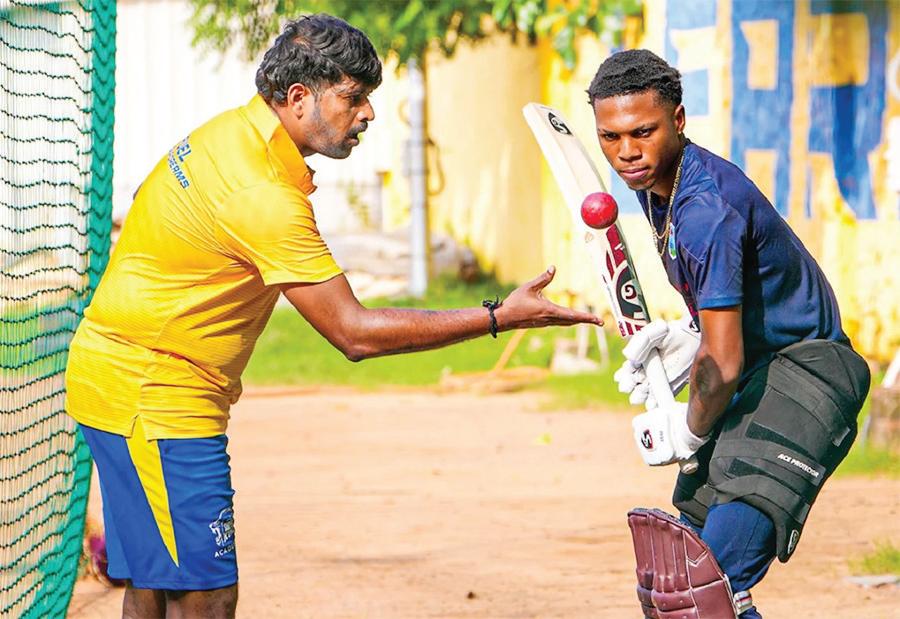
By Sean Devers
Antiguan Jewel Andrew has enjoyed rapid success in his short cricket career.
Last October, Jewel, at 17 years and 334 days, became the youngest West Indian to play in an ODI when he debuted against Sri Lanka, breaking Xavier Marshall’s record.
However, the lad, from an Island that produced three of the greatest players to don the maroon cap (Sir Vivian Richards, Sir Andy Roberts, and Sir
Curtly Ambrose), did not bat in what is his only ODI to date.
While Jewel and his brother Hillroy Andrew were born in Antigua, their mother, Veronique Hill, was born in Guyana’s largest County, Essequibo.
Jewel, who turned 18 on December 7, last year, scored 122 and 65 in his previous match against CCC after making 62 against Jamaica and 57 versus the West Indies Academy.
Jewel could add a cou-
ple of tons with four possible innings remaining before this year’s West Indies Four-Day Championships is concluded.
“My season is going great. It’s something that I have been thinking about… so it’s just for me to live it now.
Making my maiden First-Class century feels like a dream that I don’t want to wake up from. My recent performances stem from the support I’ve been getting from teammates and family.
I learned that at the
ON Friday last, Slingerz Football Club put on a master class as they showed their quality against Mainstay Gold Star who are making their debut in the Guyana Football Federation (GFF) Elite League season 7 at the National Training Centre.
Slingerz, who finished second in season 6, put on their best showing against Gold star to capture a 17-nil victory and showed the value of their pre-season transfers.
Slingerz Darren Niles and Marcus Tudor scored hat-tricks with a double from Kelsey Benjamin but Kemar Beckford was the chief destroyer with quadruple of goals they dominated both halves of the clash for the victory.
Slinegz had a 9-nil lead at the half before finishing it out handsomely 17-nil. Meanwhile, in the night’s second encounter Santos FC battled with the Guyana Police Force with the clash ending 1-1.
Carl Griffith scored for Santos with Kevin Lane scoring for Police Force. The league features 90 games over a 6 months period with Top Side in Season 7 of the Elite League collecting $2M and being awarded an automatic qualifying spot at the CONCACAF/ Caribbean Shield Championships.
The second place team collects $1,200,000, 3rd Place $800,000 and 4th Place $500,000.
first-class level you can’t cheat the game and have an off day because it will show in the match”, posited Jewel, a gifted wicket-keeper/ batter.
“In youth cricket I scored freely with more bad balls to put away… Meanwhile, playing in first-class cricket I have more good bowlers to face so the percentage of bad balls is lower so I have to concentrate for longer periods” continued Jewel who recently received the 2024 Junior Sportsman award which was present-
ed by Antigua’s Minister of Sports and Education the honorable Darryl Matthews.
On the day he collected his award, Jewel blasted 113 from 44 balls with seven fours and 12 sixes for Piggott’s Crushers against Rising Sun in a domestic game in Antigua. His elder brother Hillroy Anderw played on the opposing team.
The Leewards Islands face Guyana in the penultimate round of the firstclass Championships in St Kitts on Wednesday
and Jewel aims to register centuries in consecutive games.
The last time these two teams met in a First-Class match, the Leewards, on the back of twin tons from Mickel Louis, defeated Guyana by 273 runs last year in St Kitts.
The classy Jewel is keen to repeat Louis’ performance and become the 13th batter to accomplish that feat since Roy Fredericks did it for the first time in 1967 against Barbados at Bourda.
TURN TO PAGE 21
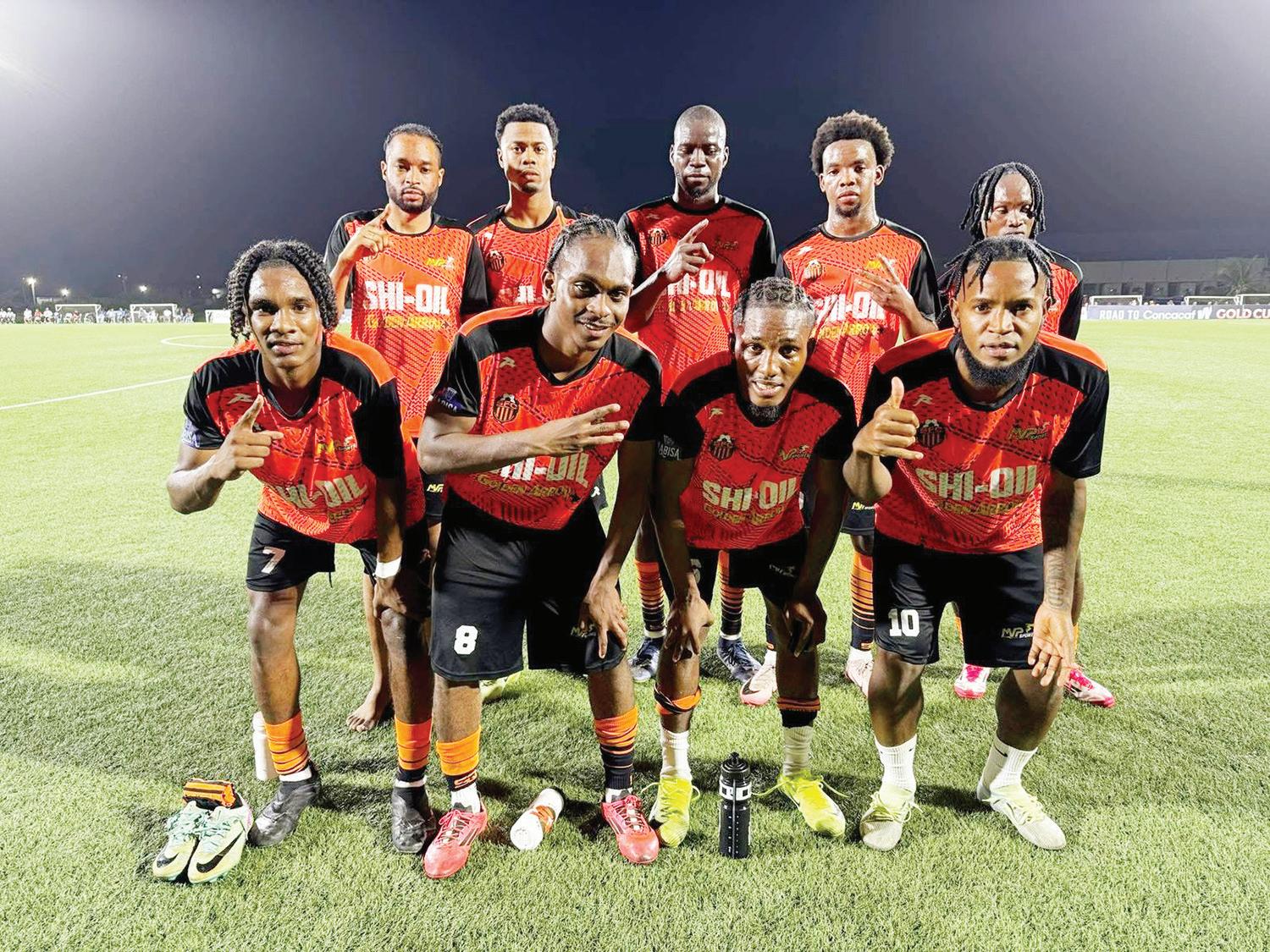
Headquarters retained championship honours when the Commissioner of Police (COP) annual T20 knockout tournament, climaxed at the Police Sports Club ground, Eve Leary on Friday.
Witnessed by Commissioner of Police Clifton Hicken and other senior officers of the Force, Headquarters withstood the challenge of Officers in a close encounter to triumph by seven runs, thereby becoming the first team to win back-to-back titles since the tournament was introduced.


Set 151 for victory, after Headquarters were dismissed for 150 in 19.3 overs, Officers fell for 143 in the identical number of overs.
The in-form Kevon Boodie (39) and Pernel London (18) gave Headquarters a reasonable start of 59 but both openers lost their wickets at the same score, with Boodie hitting four fours and two fours in what turned out to be the top score.
Headquarters slipped to 103 for six but a vital seventh wicket partnership of 40 from Troy Leitch, who spanked two fours and an equal number of sixes in 34 and David Hickel (15) added some impetus to the innings.
Troy Benn finished with three for 20 from three overs, Bernard Bailey two for 20 from four and Stephen Harris two for 27 from 3.3.
Officers suffered an early setback when Benn departed
with only 12 on the board but recovered admirably through a fine second wicket stand of 58 between skipper Ravindradat Budhram who stroked four fours in 31 and Stephen Harris whose 28 included two fours and two sixes.
National middle-order batsman, Kemol Savory, who promised much with a quickfire nine-ball 21, spiced with two fours and two sixes, flattered to deceive, becoming one of Khanaiya Ramkarran’s four

WEST Indies superstar Nicholas Pooran has revealed the key behind his six-hitting technique. Pooran was the West Indies' leading run-scorer at last year's ICC Men's T20 World Cup with 228 runs and finished the tournament having hit more sixes (17) than any other player that featured at the event.
The 29-year-old showcased his batting exploits with another fine performance in the Indian Premier League (IPL) with the Lucknow Super Giants on Thursday as he smashed six maximums during a 26-

ball 70 to help his side to an impressive five-wicket victory over Sunrisers Hyderabad. He also has four more sixes than any other player at the IPL thus far and the former West Indies white-ball skip -
per believes keeping a clear mind at the crease is helping him maintain the status as one of the biggest hitters in world cricket.
"I don't plan to hit sixes," Pooran said.
"I just try my best to
get in good positions and if it's there, just time the ball nicely.
"In the last nine years I have been working on my craft. Obviously, I have been getting the opportunity to bat higher up in the Powerplay as
well.
"It is really important to cash in when the wicket is nice and obviously when the match-up is there you try your best to execute your skills."
Pooran's best effort at last year's T20 World Cup was an innings of 98 - from just 53 deliveriesagainst Afghanistan in St Lucia during the group stage of the event that helped the West Indies remain undefeated at the tournament and qualify for the Super Eights.
While the West Indies fell just short of qualifying for the knockout stages of the T20 World Cup, Pooran's efforts
with the bat didn't go unnoticed as he won his way into the ICC Men's T20I Team of the Year for the second consecutive year.
It was just rewards for Pooran, who admitted he is lucky to have been born with such considerable talent.
"I've never worked on my bat speed, I'm just blessed with incredible talent," Pooran said.
"I am really happy that I have put in the work over the years and I am getting the reward on the cricket field and winning games for my team as well." (ICC Media)
By Sean Devers
NATIONAL Captain Tevin Imlach put on a batting master-class yesterday at Bourda to lead DCC to a 126-run victory against GCC, as action continued in the GCA’s Dave’s West Indies Imports first division 50-over cricket tournament.
Watched by a large and raucous gathering of mostly DCC fans, the Queenstown unit opted to bat in bright sunshine on a good track and fast outfield, and on the back of Imlach’s magnificent 156 from 130 balls with 10 glorious boundaries, DCC galloped to the tournament’s highest total of 352-8, surpassing Malteenoes’ 350-8 against Eldorado.
The 28-year-old Imlach, who is scheduled to depart Guyana tomorrow for St. Kitts, where Guyana will battle the Leewards in the penultimate round of West Indies first-class championship, shared in four half-century partnerships.

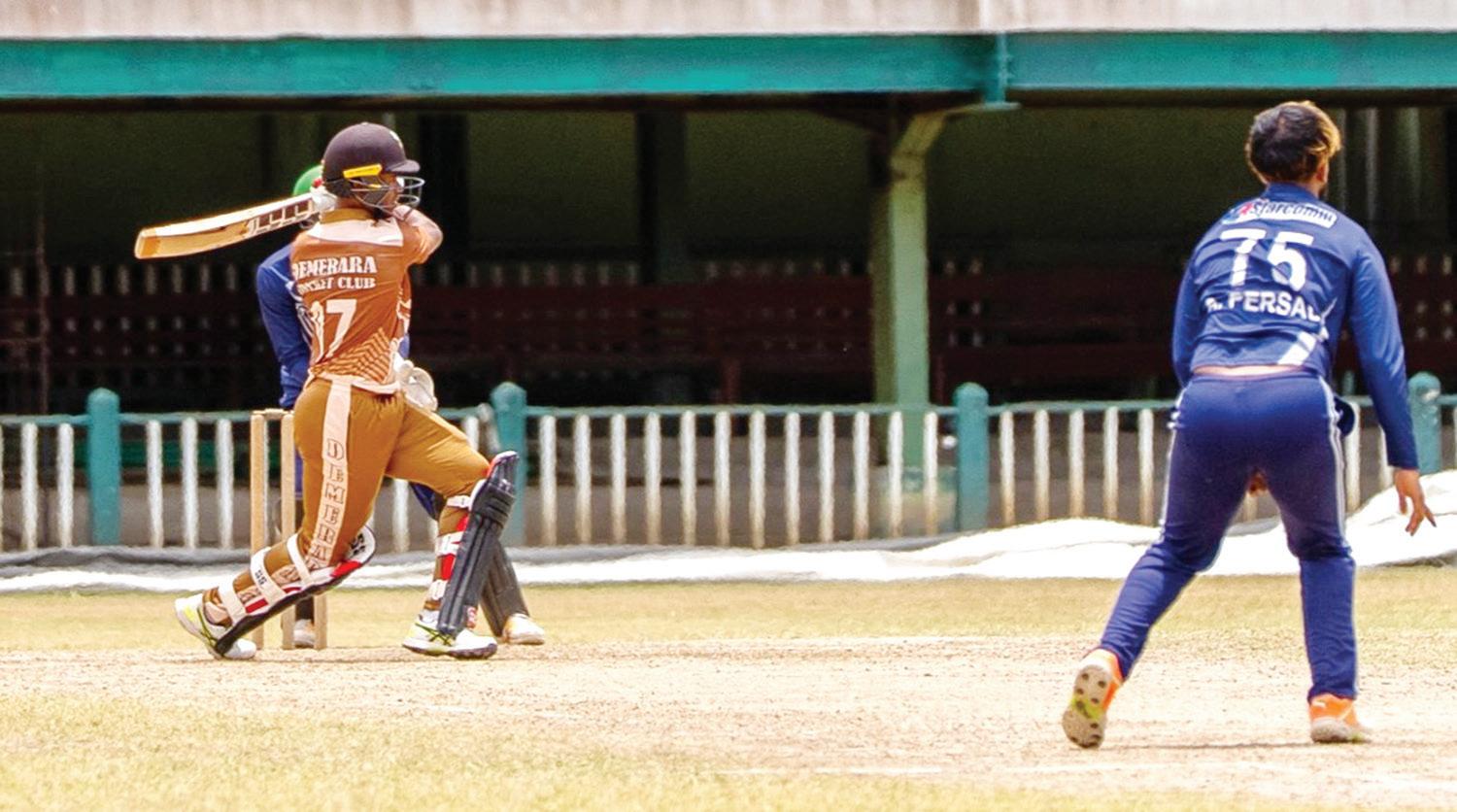

Lord had 3-60, while Sinclair took 2-66 for GCC, who were 35-1 when Yeudister Persaud (18) fell to Perez.
Navindra Persaud batted through the innings to finish, unbeaten, a well-complied 96 from 136 with 10 fours after last man Tycee Glasgow (1) was run out with one ball remaining in the match.
National all-rounder Renaldo Ali-Mohammed dismissed the dashing Perez for a cameo 25 with two fours and couple of sixes, before Imlach, who made 83 in the last round of this competition, and 18-year-old Jonathan Van Lange joined forces. But with the score on 148 and a partnership worth 79, Van Lange attempted a slugsweep from outside the off
With openers Brandon Jaikarran (0) and Alphius Bookie (2) dismissed with 15 runs on the board, Raymond Perez, who will also be on the plane to St. Kitts, joined Imlach, and the pair took the score to 69-3 when the 54-run stand was broken.
stump, and top-edged a catch to point as Sinclair made the breakthrough. Van Lange’s 35-ball 39 included two fours and three sixes.
Imlach, who reached his fifty from 35 balls with three fours and a six after being dropped on 18 off Ali-Mohammed, added 67 with Sachin Singh before Singh (23) was bowled by Sinclair at 219-5.
Former West Indies T20 player Chris Barnwell (18) and Imlach, who reached his century from 81 balls with seven fours and a six, much
to the delight of the DCC fans, was removed by leftarm spinner Devon Lord at 219-5, as the GCC Captain broke the 52-run stand.
After reaching his ton, Imlach changed gear and whipped Lovell for four, before using his feet to the expensive Sinclair, and depositing his fellow Test player for consecutive sixes.
Joshu Persaud hammered Lovell for two fours and a six in an expensive over, while Imlach dumped Sinclair, who bowled too fast, for a massive straight six as boundaries
flowed at Bourda.
Persaud pulled Ali-Mohammed for two sixes before smashing the pacer for four to reach his 50 from 28 balls with two fours and three sixes as the carnage continued.
Imlach soon reached his 150 from 126 balls decorated with 10 classy fours and four well-timed sixes before he was bowled by the impressive Lord at 336-7.
Ashamed Nedd, set to make his first debut for Guyana in St. Kitts, was bowled by Lord. Persaud was on 53 when the 50 overs expired.
The 22-year-old Persaud, who will become a qualified doctor next month got support from Sinclair as the pair put on 69 for the second wicket, before Sinclair, who pulled Perez for three sixes with the last one landing on the Shiv Chanderpaul Drive
But Sinclair, in his second match for GCC, was removed by Nedd for 38 with one four and four sixes at 104-2.
Ali-Mohammed (15), Dhanish Persaud (21) and Lovell (13) were the only other batters to reach double figures as GCC fell for 229.
Barnwell (3-42), Nedd (2-26) and Jaden Dowlin (2-28) bowled DCC to an emphatic win in what was a precursor to the Pepsi first-division final between the same two teams.
Brazil have sacked manager Dorival Junior after losing 4-1 to arch-rivals Argentina in World Cup qualifying.
They sit fourth in the South American group, having lost five of 14 games, although are still well placed to qualify for the 2026 finals.
The 62-year-old, who has managed a host of Brazilian clubs, had been in charge of

the national team since January 2024.
His first match was a 1-0 win at Wembley over England in a friendly last Marchand he went on to win seven, draw six and lose three of his 16 games in charge.
But the Brazilian Football Confederation (CBF) announced his exit after they were well beaten by Argentina, who have already
sealed their place at the World Cup.
"The board wishes him success in his continued career. From now on, the CBF will work to find a replacement," a short statement read.
Dorival, who never played for his country, led Flamengo to the 2022 Copa Libertadores - his biggest success as a manager.
Brazilian media sug-
gest, external Al-Hilal coach Jorge Jesus is the favourite for the Brazil job.
They tried and failed to appoint Real Madrid manager Carlo Ancelotti before hiring Dorival. The Athletic reported, external on Thursday that Brazil were keen to talk to Ancelotti about being in charge at the 2026 World Cup.